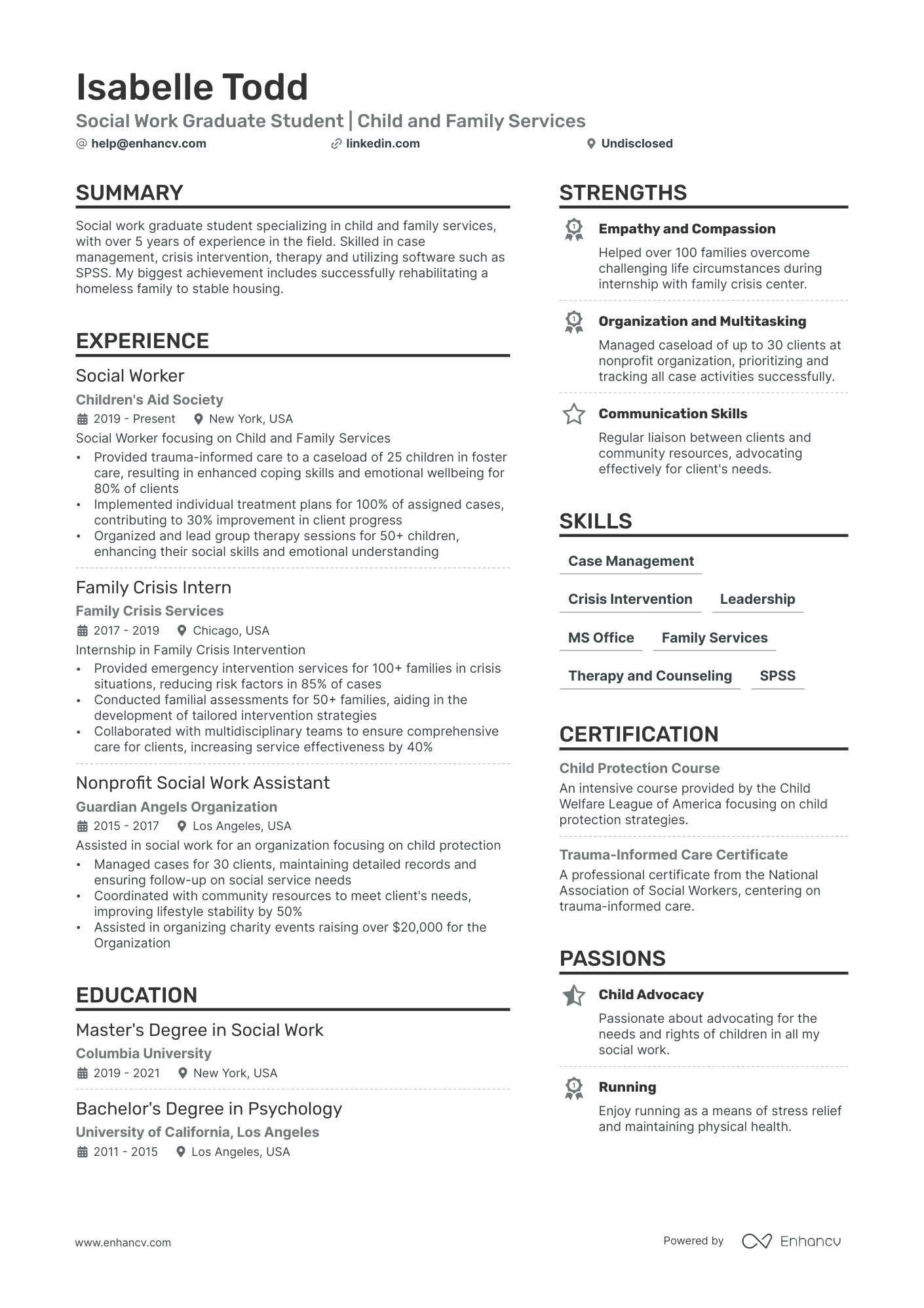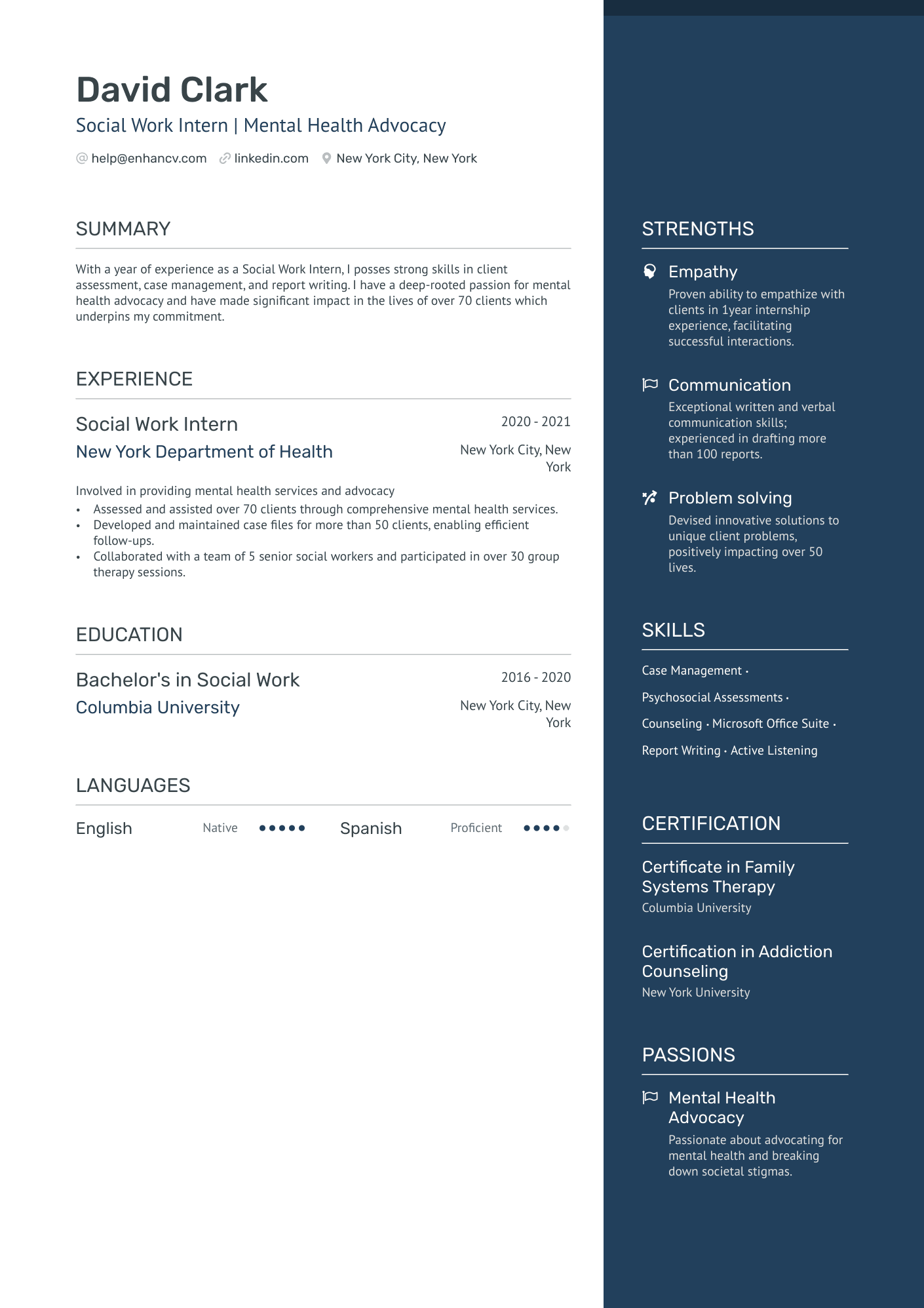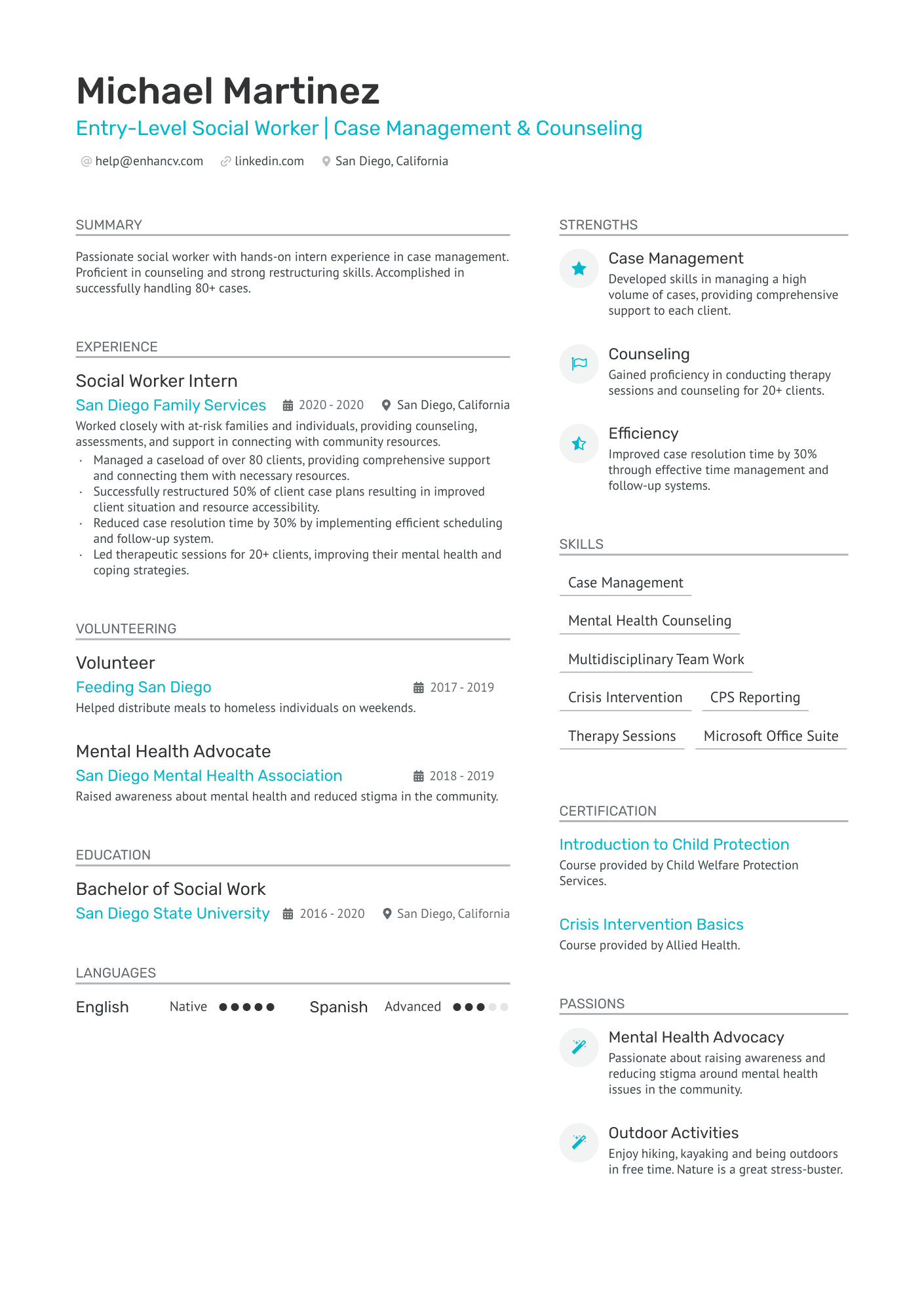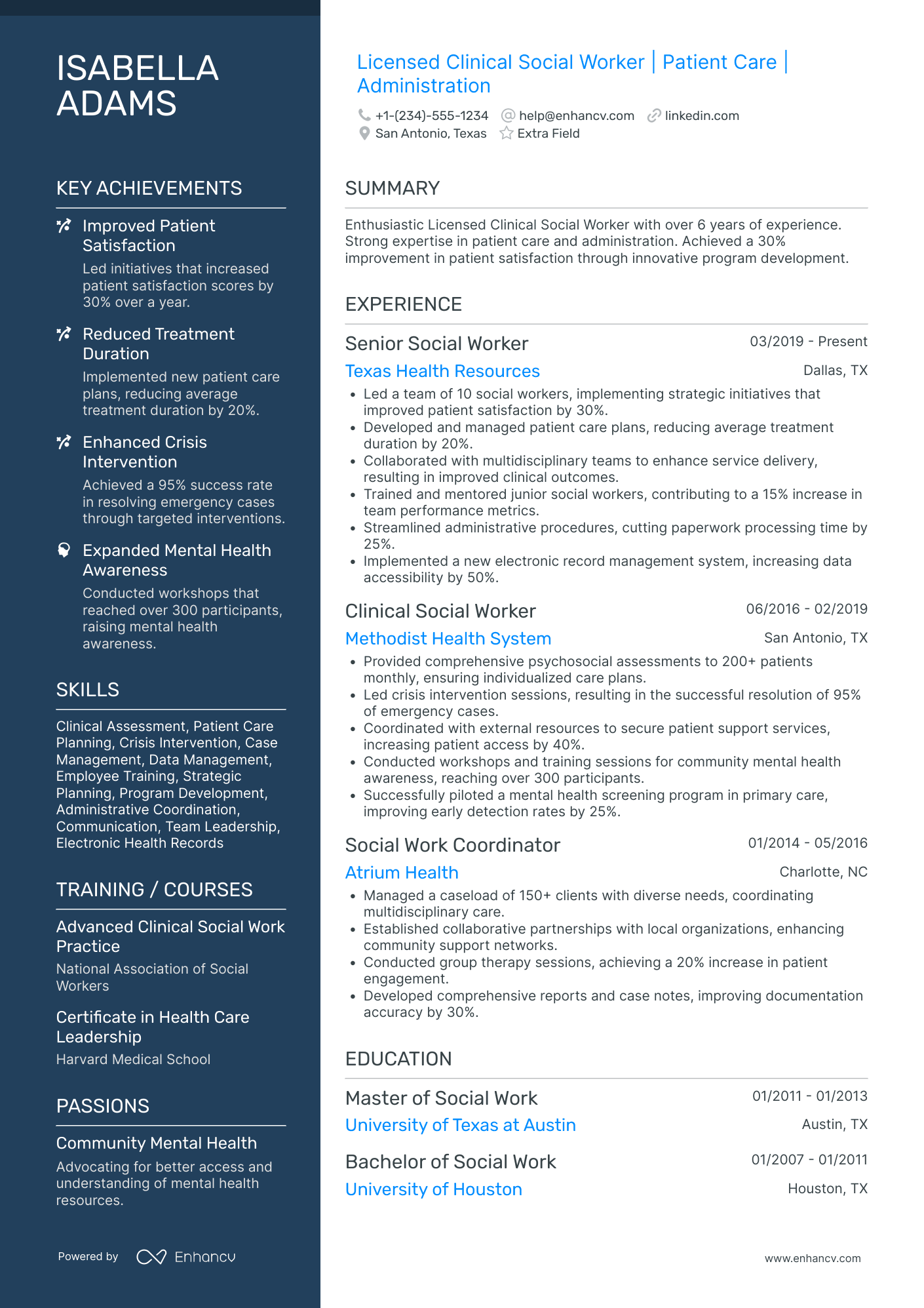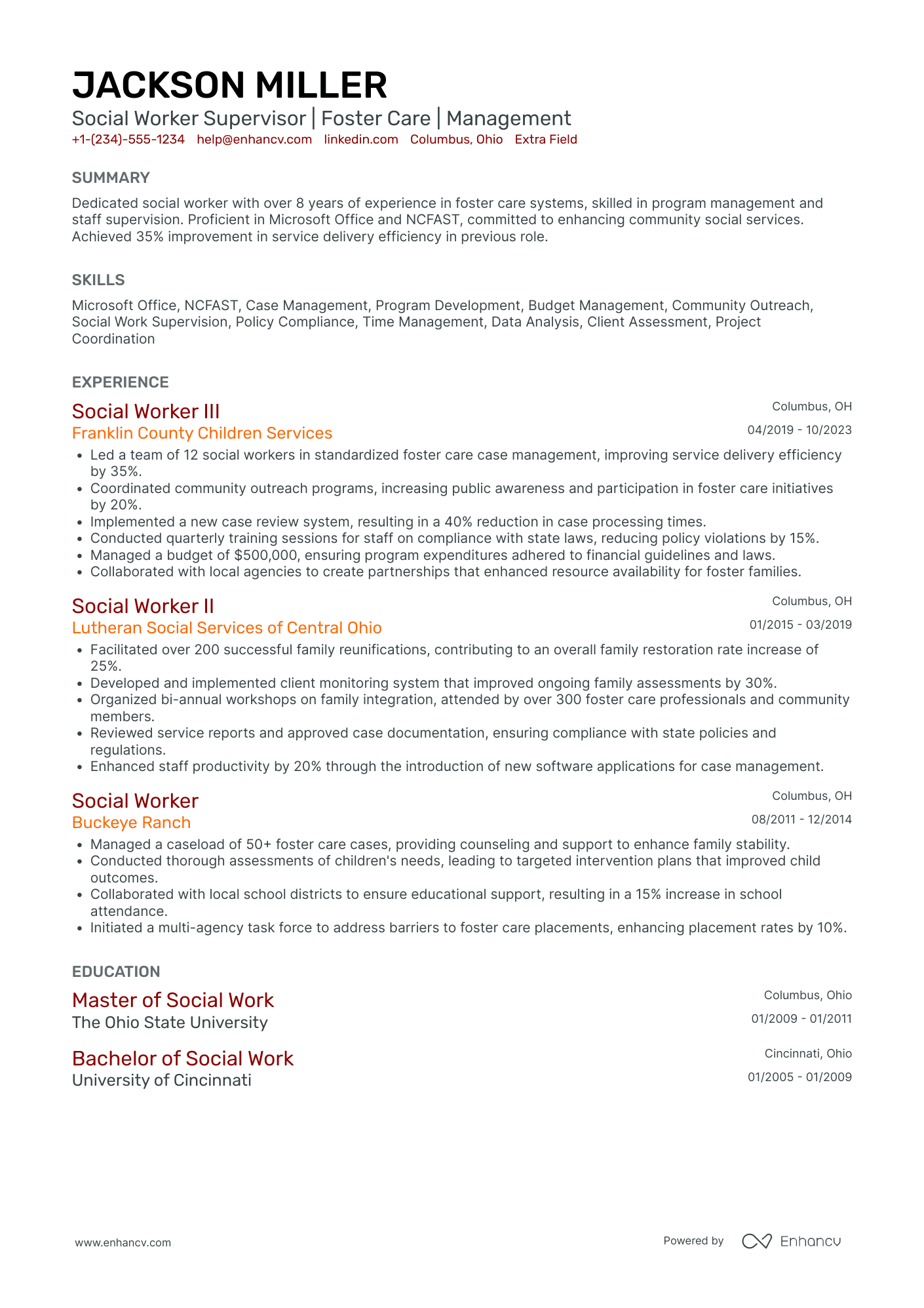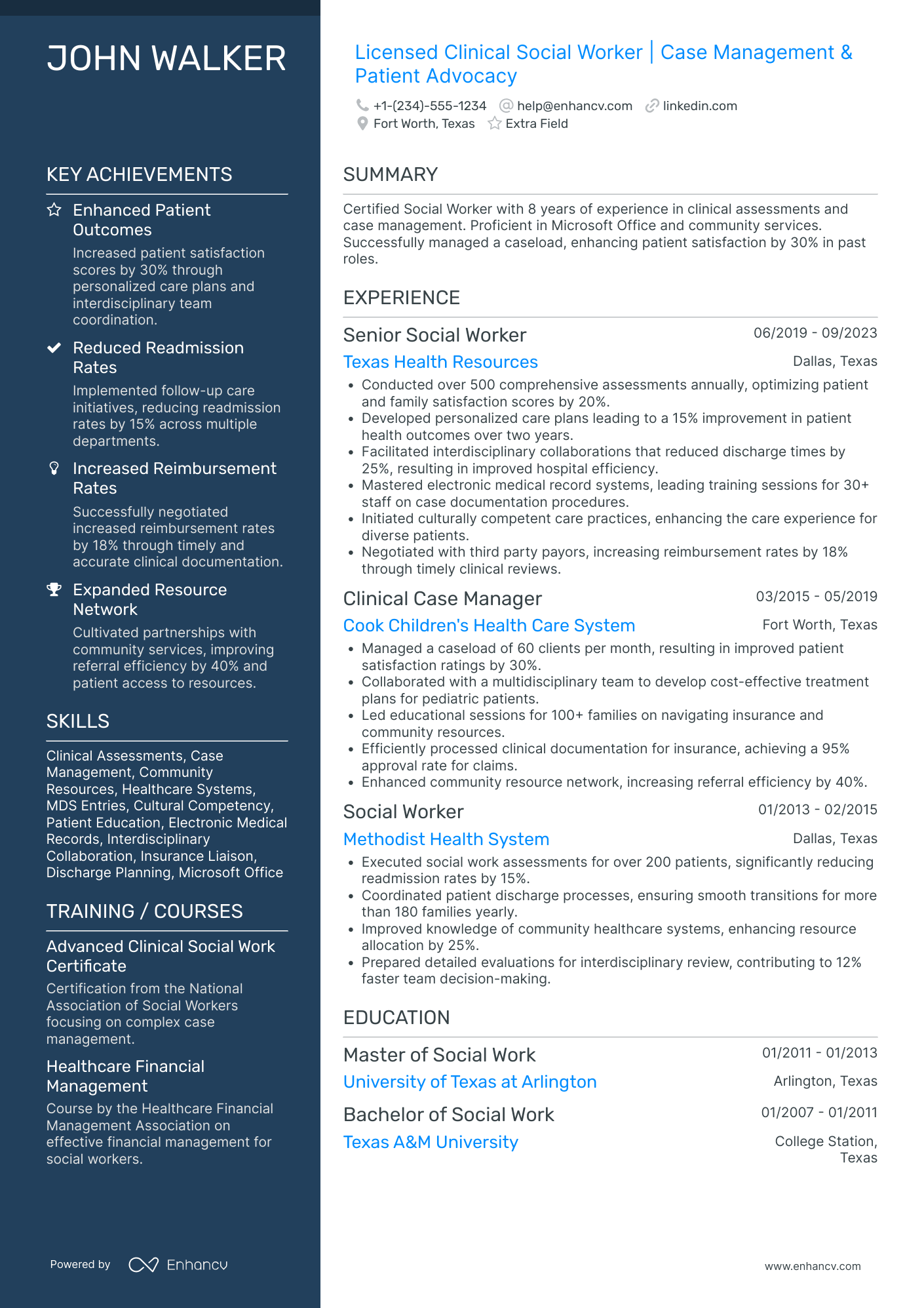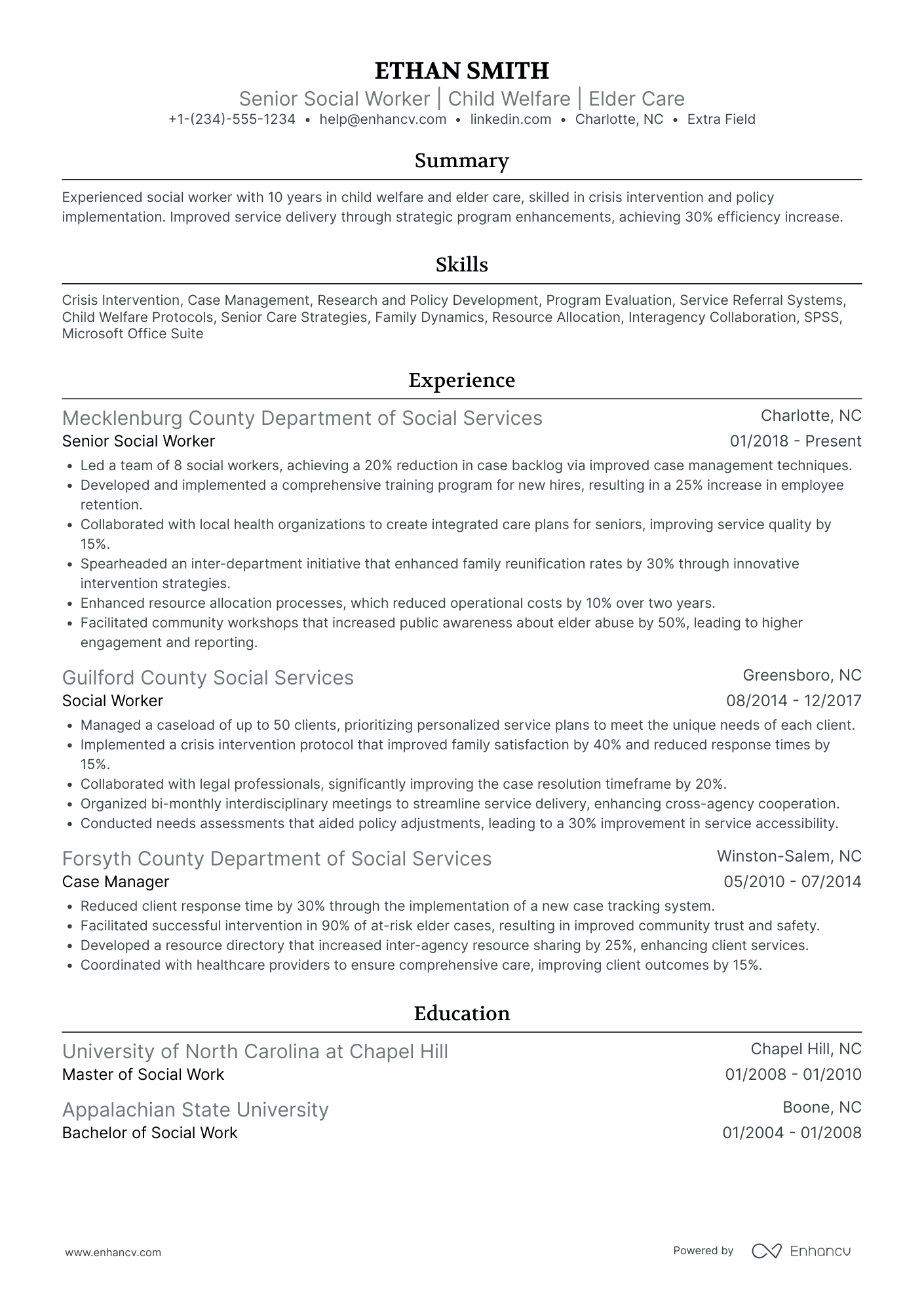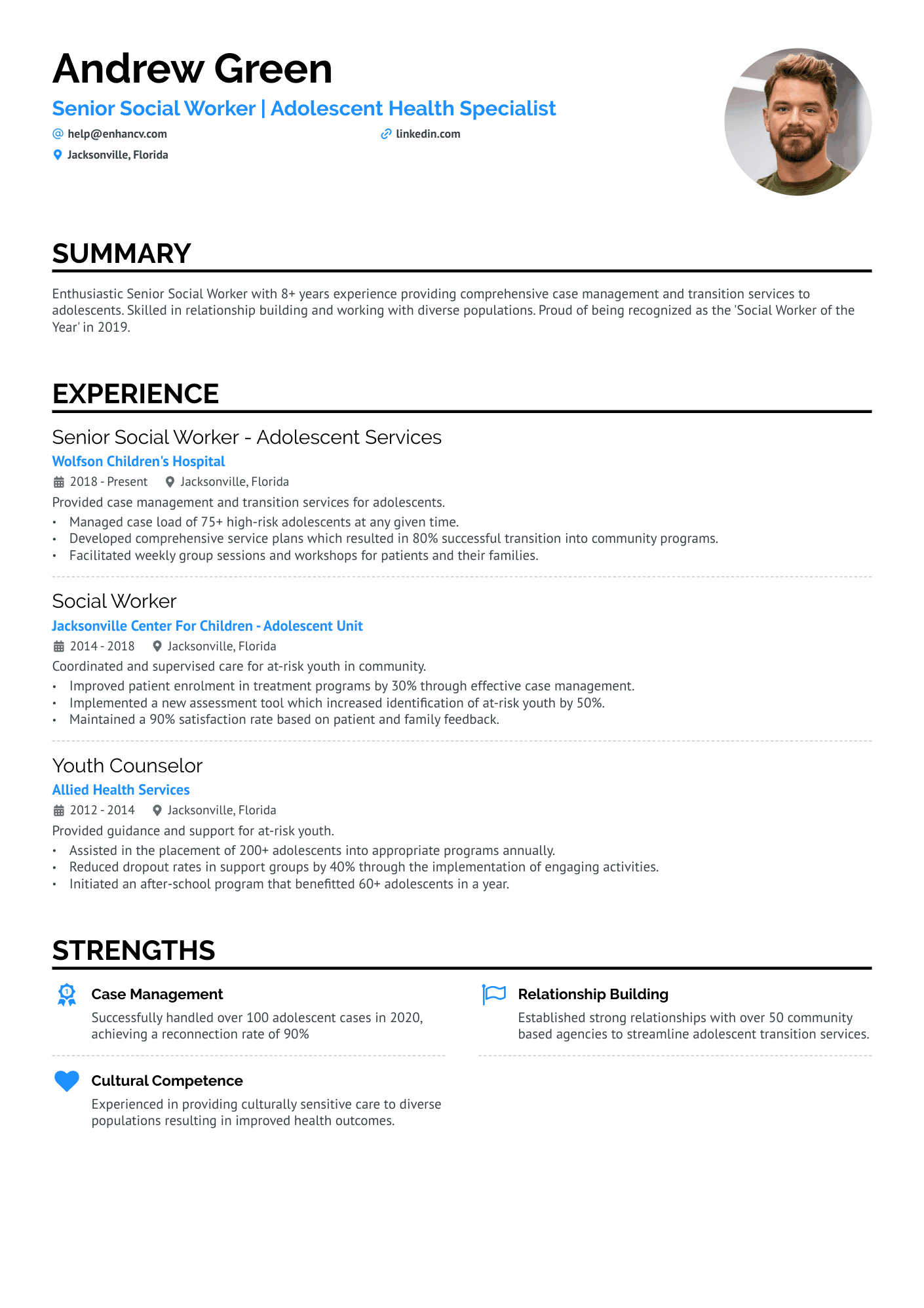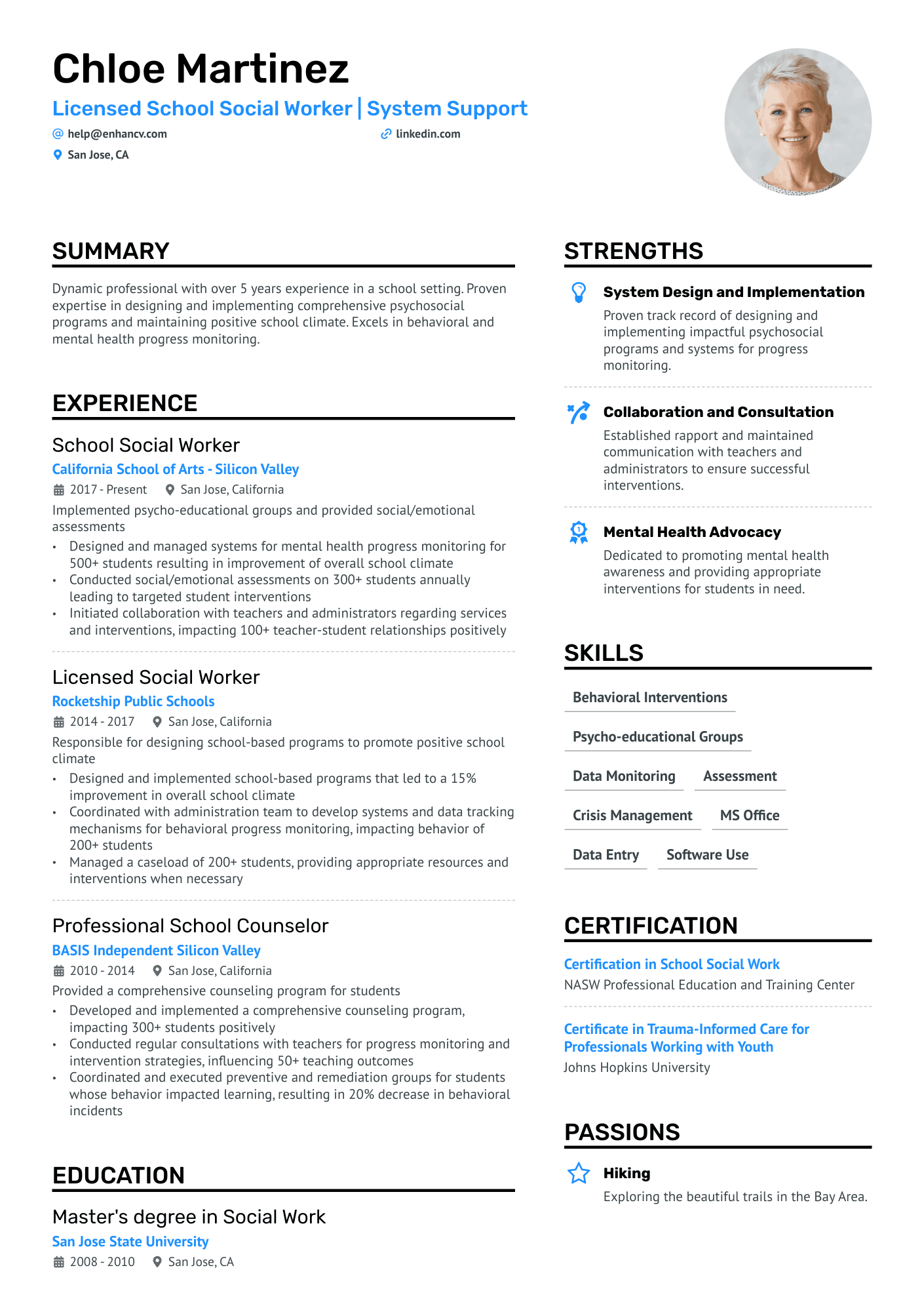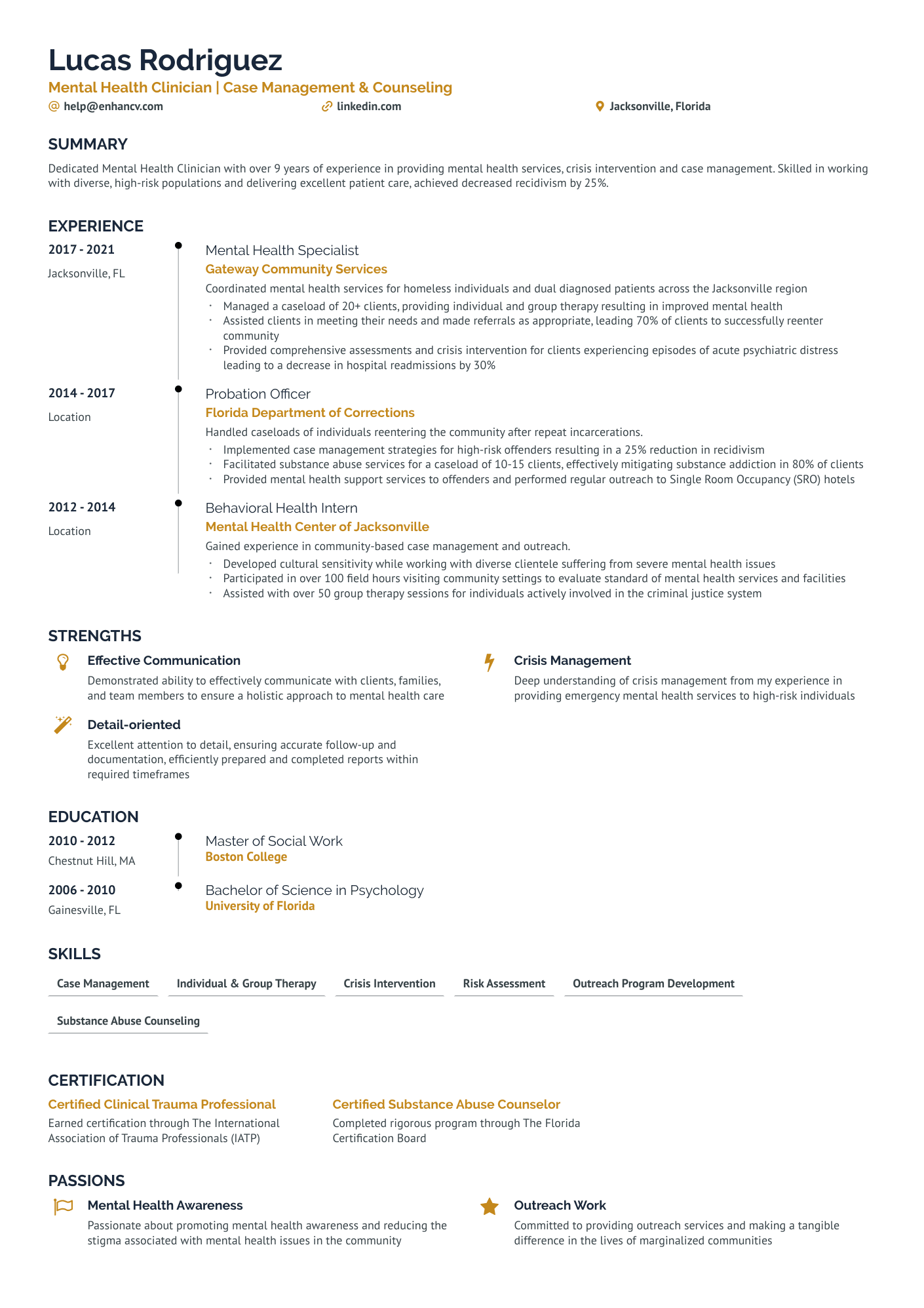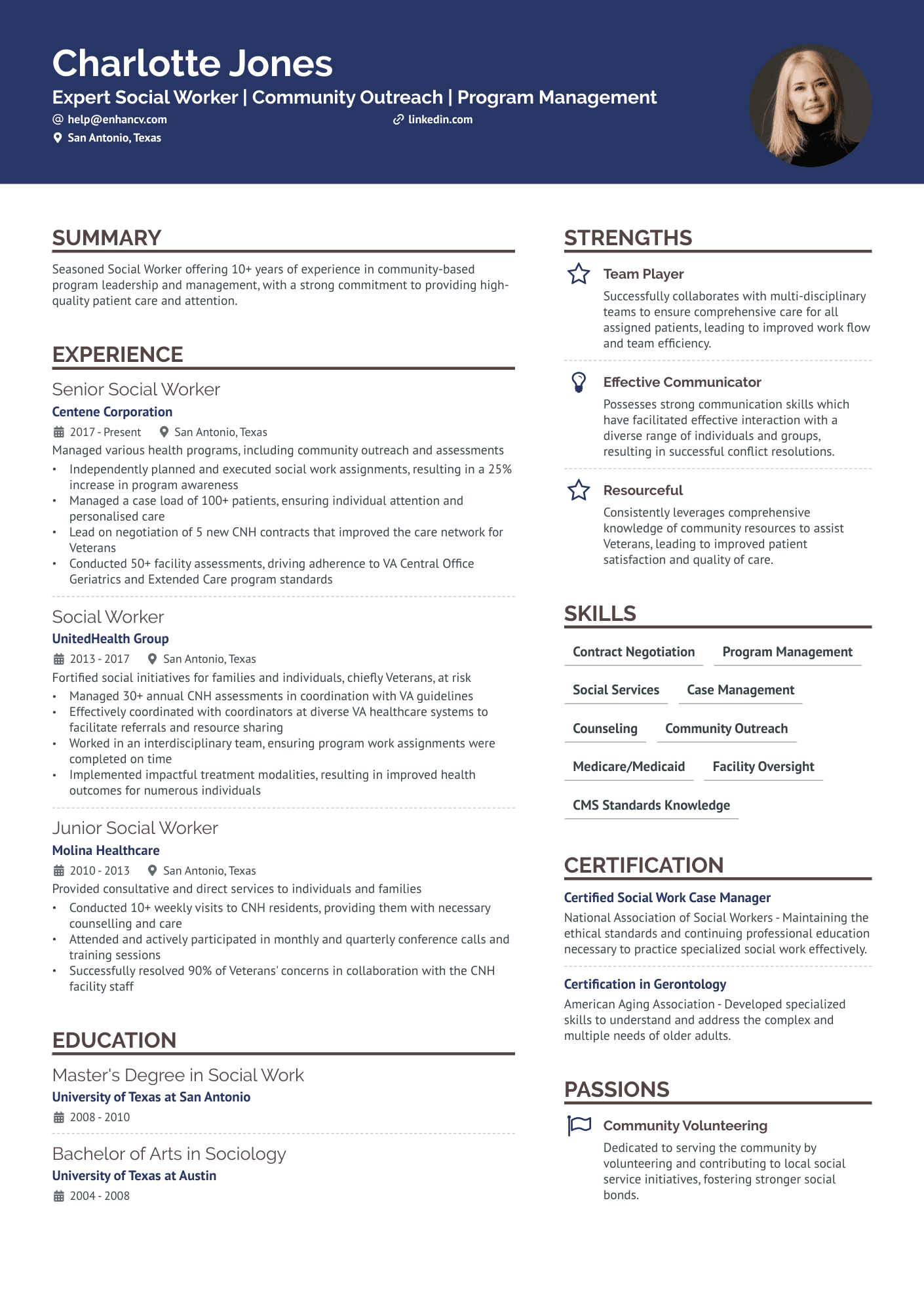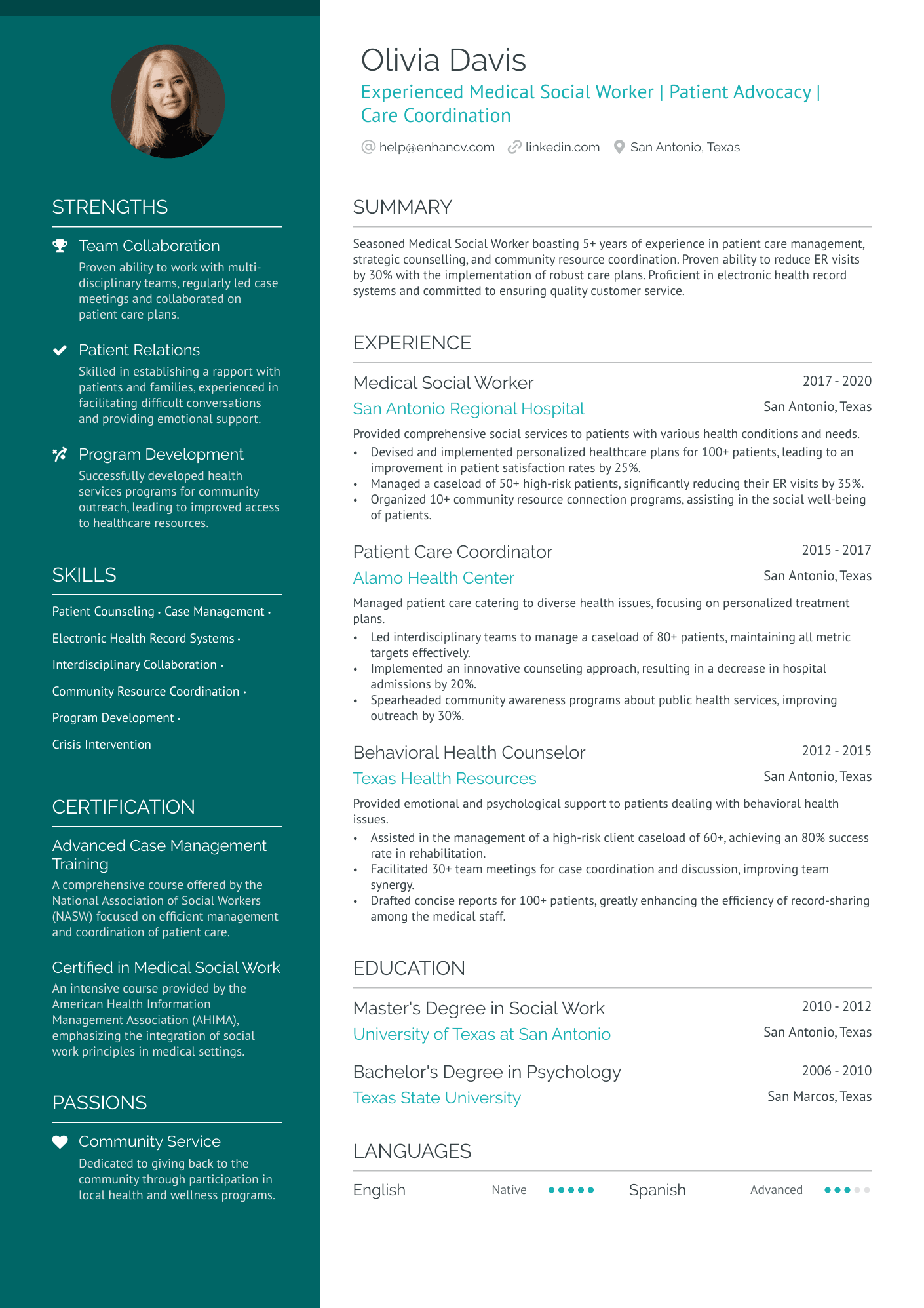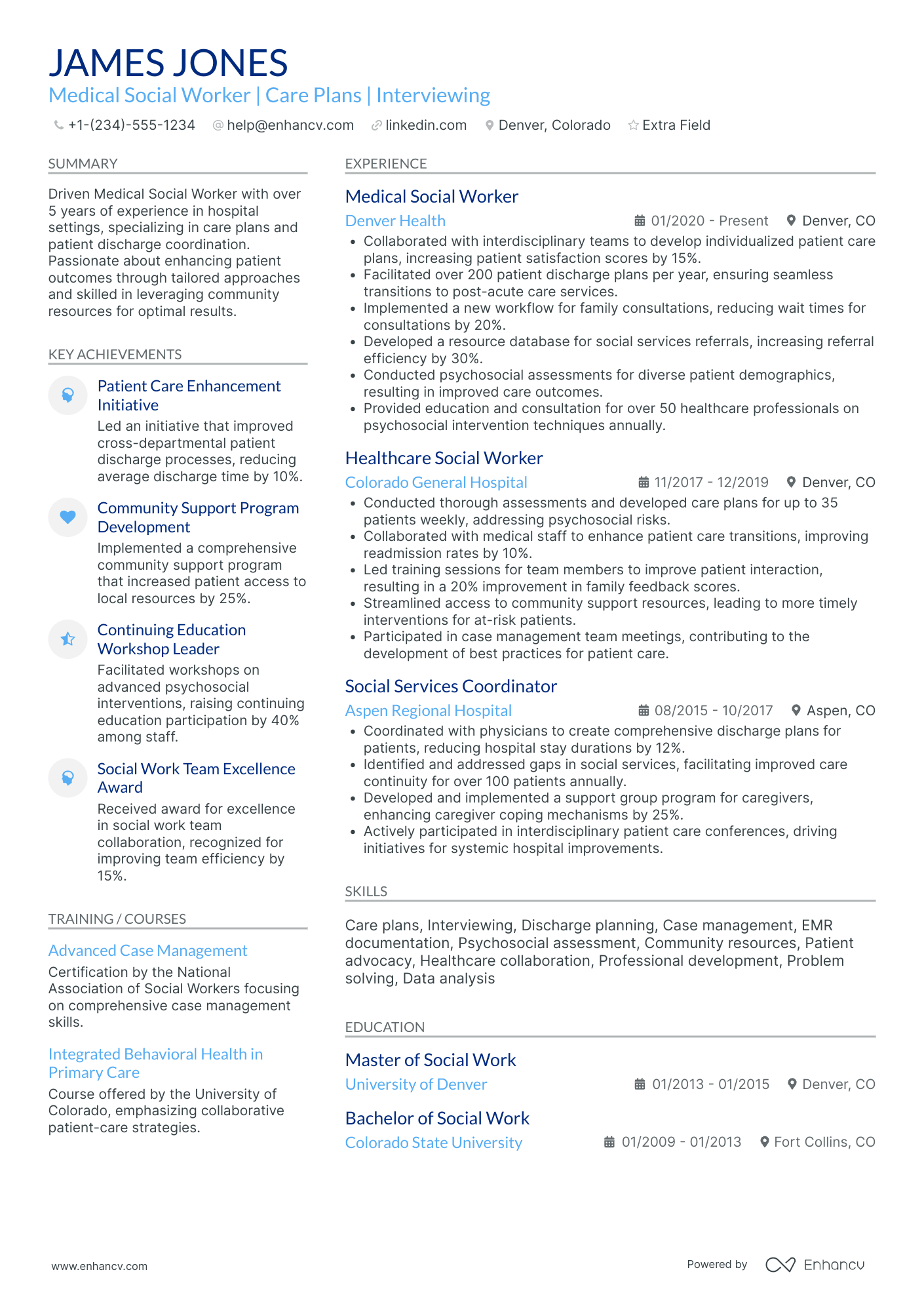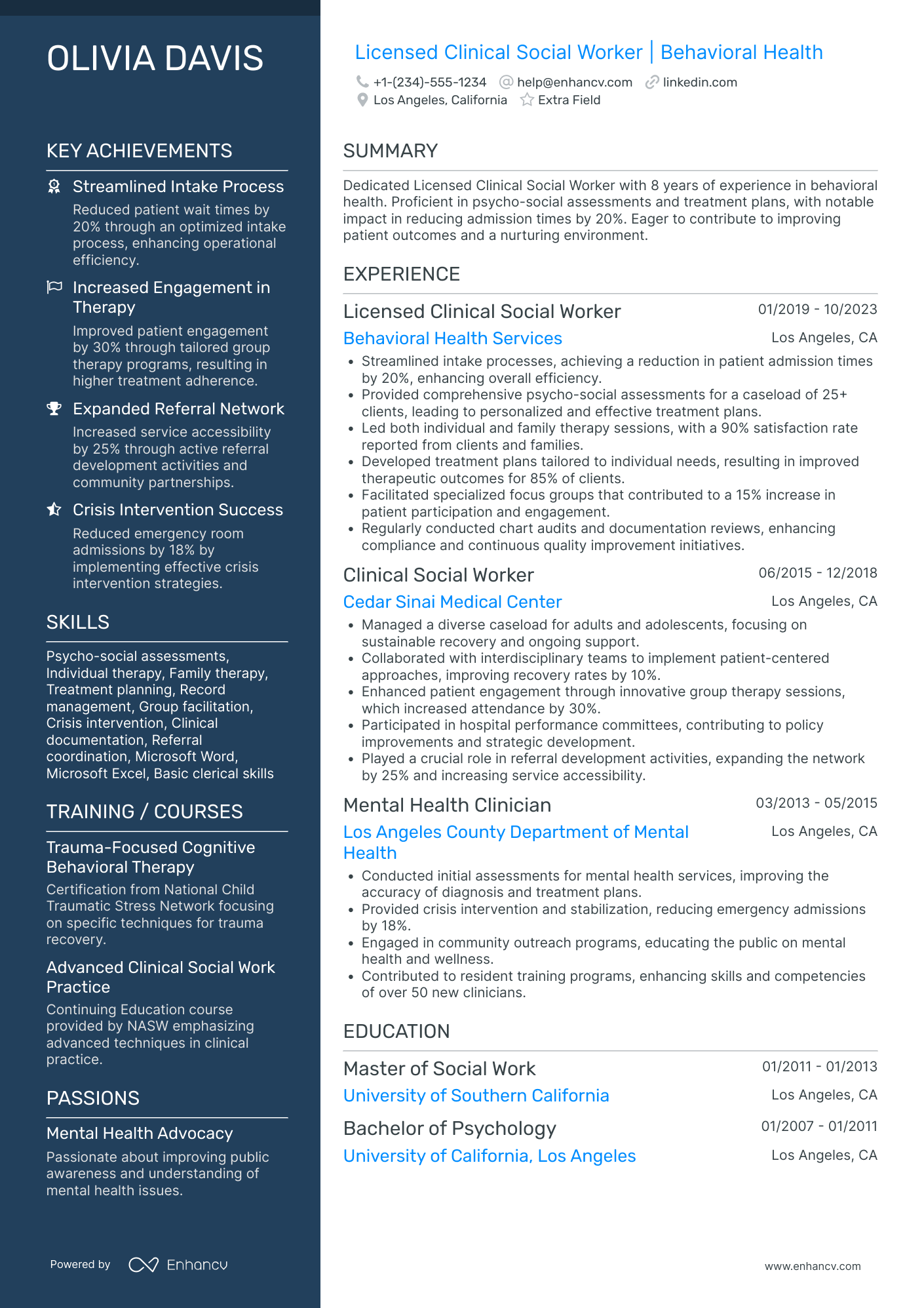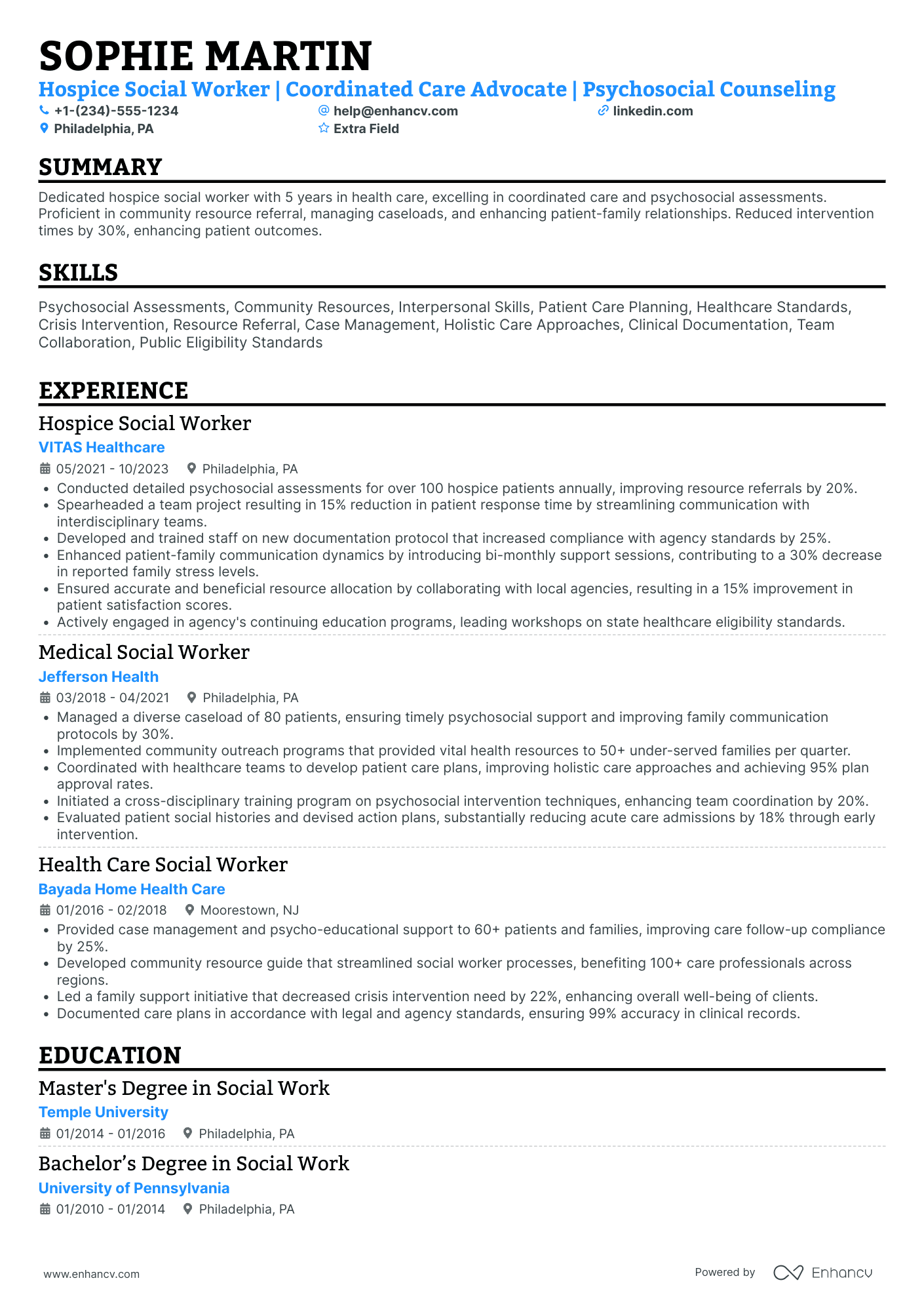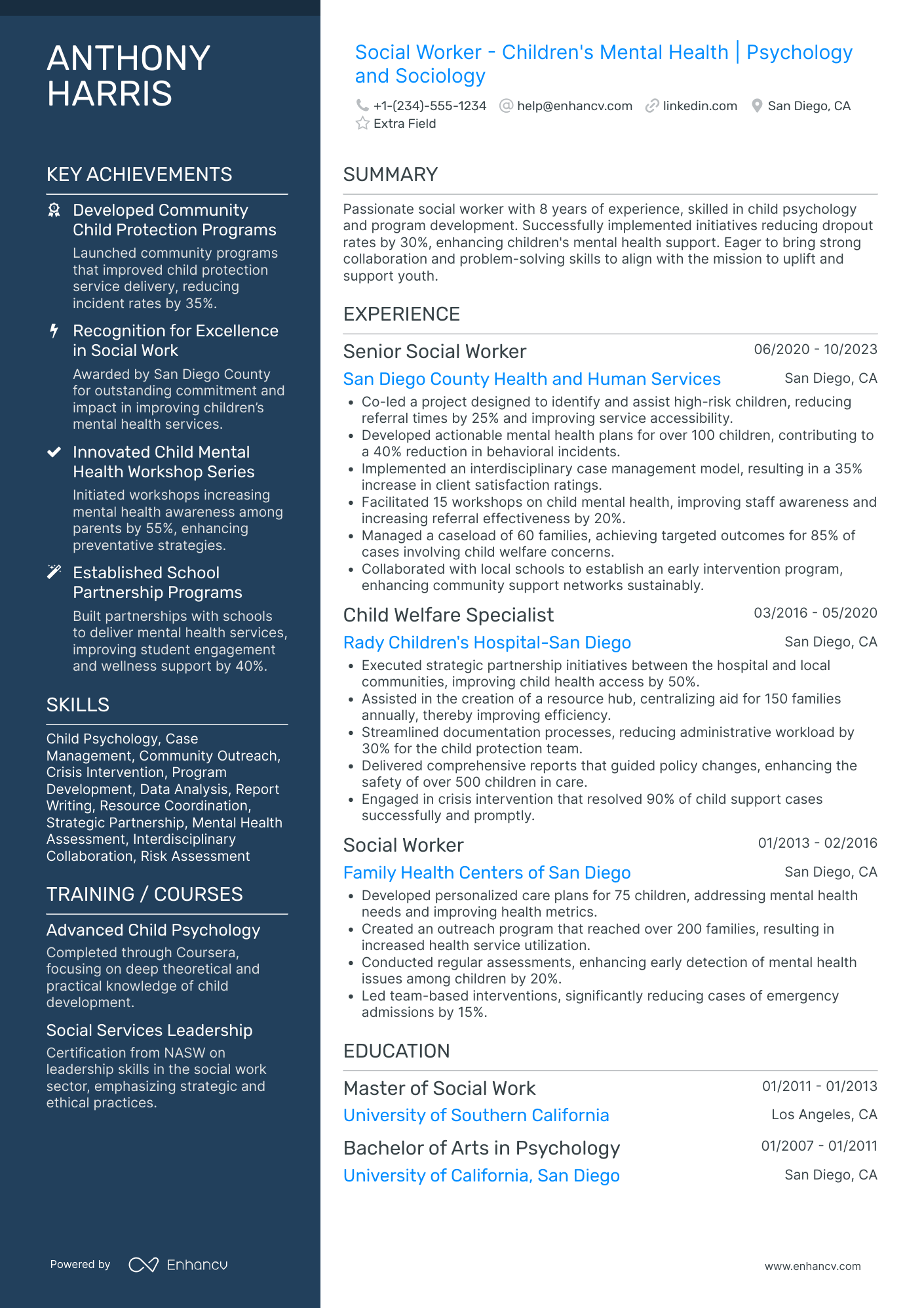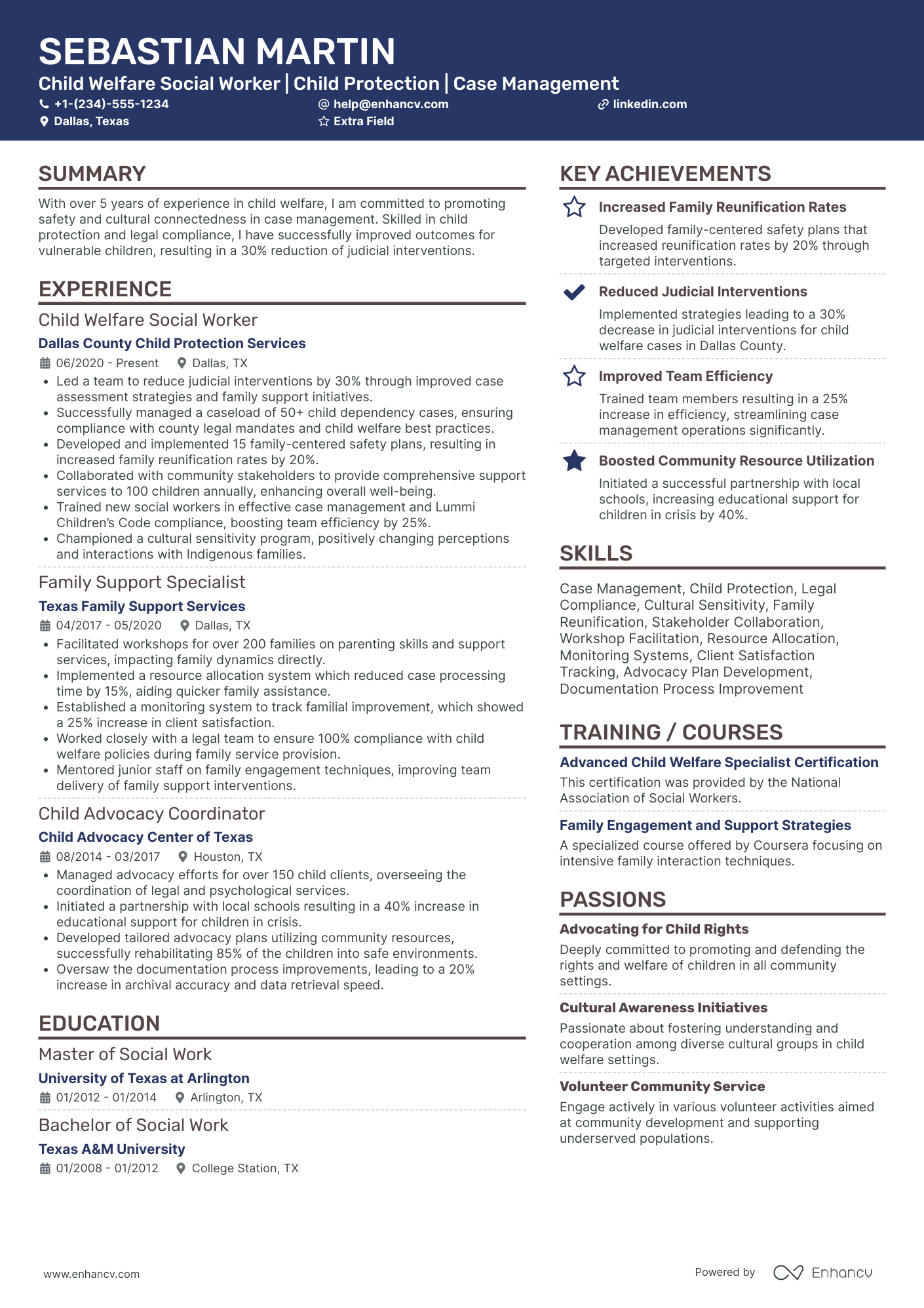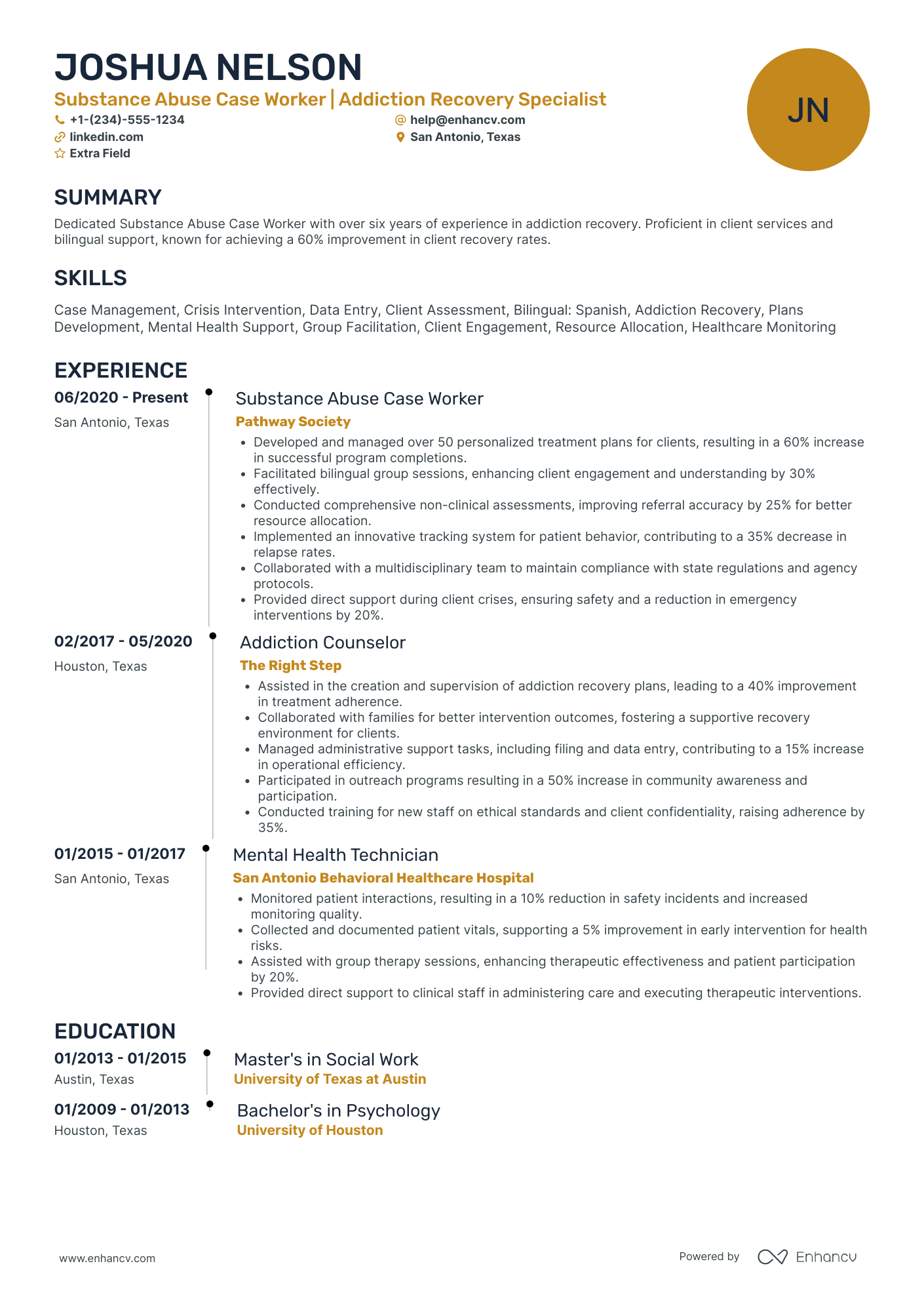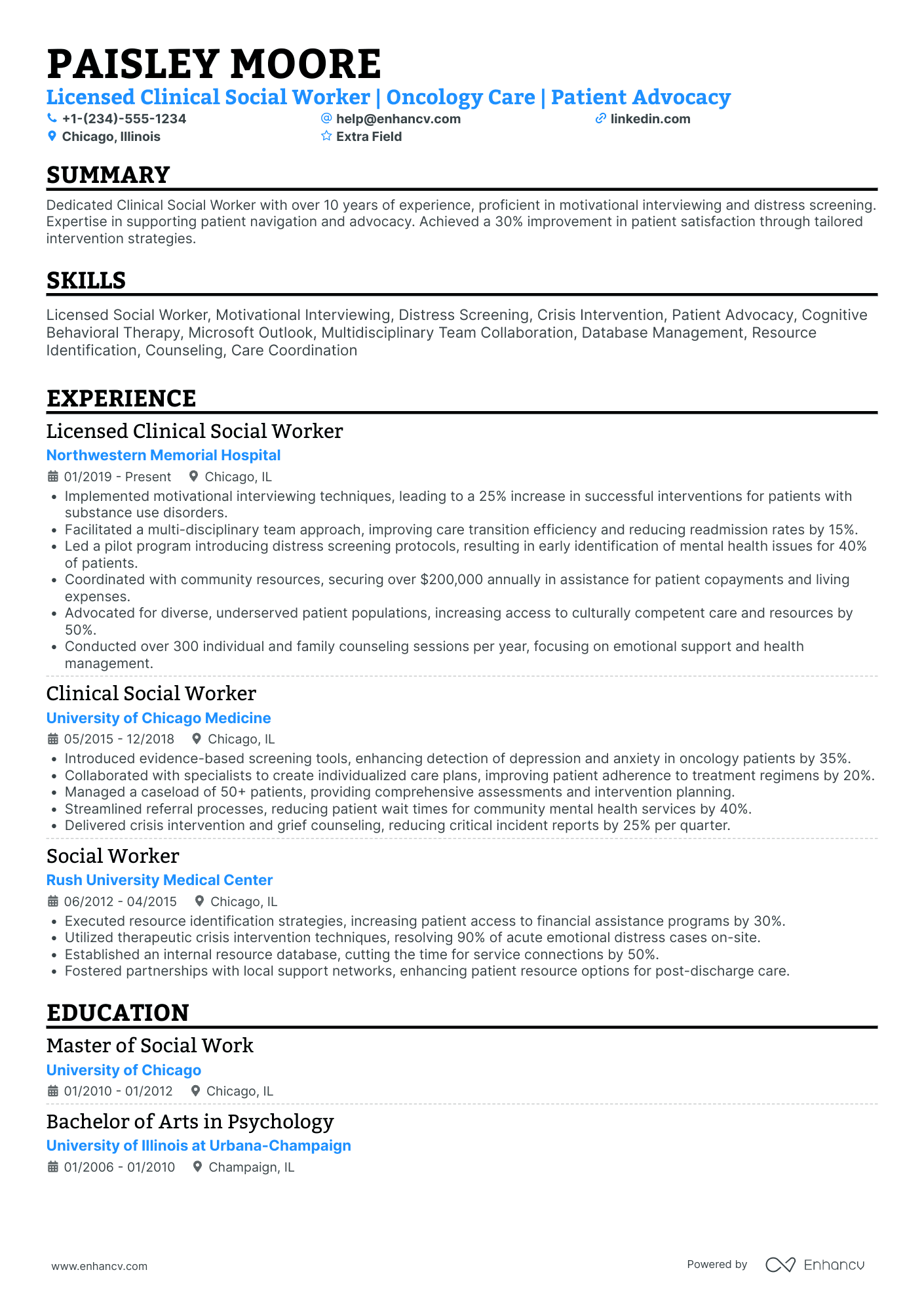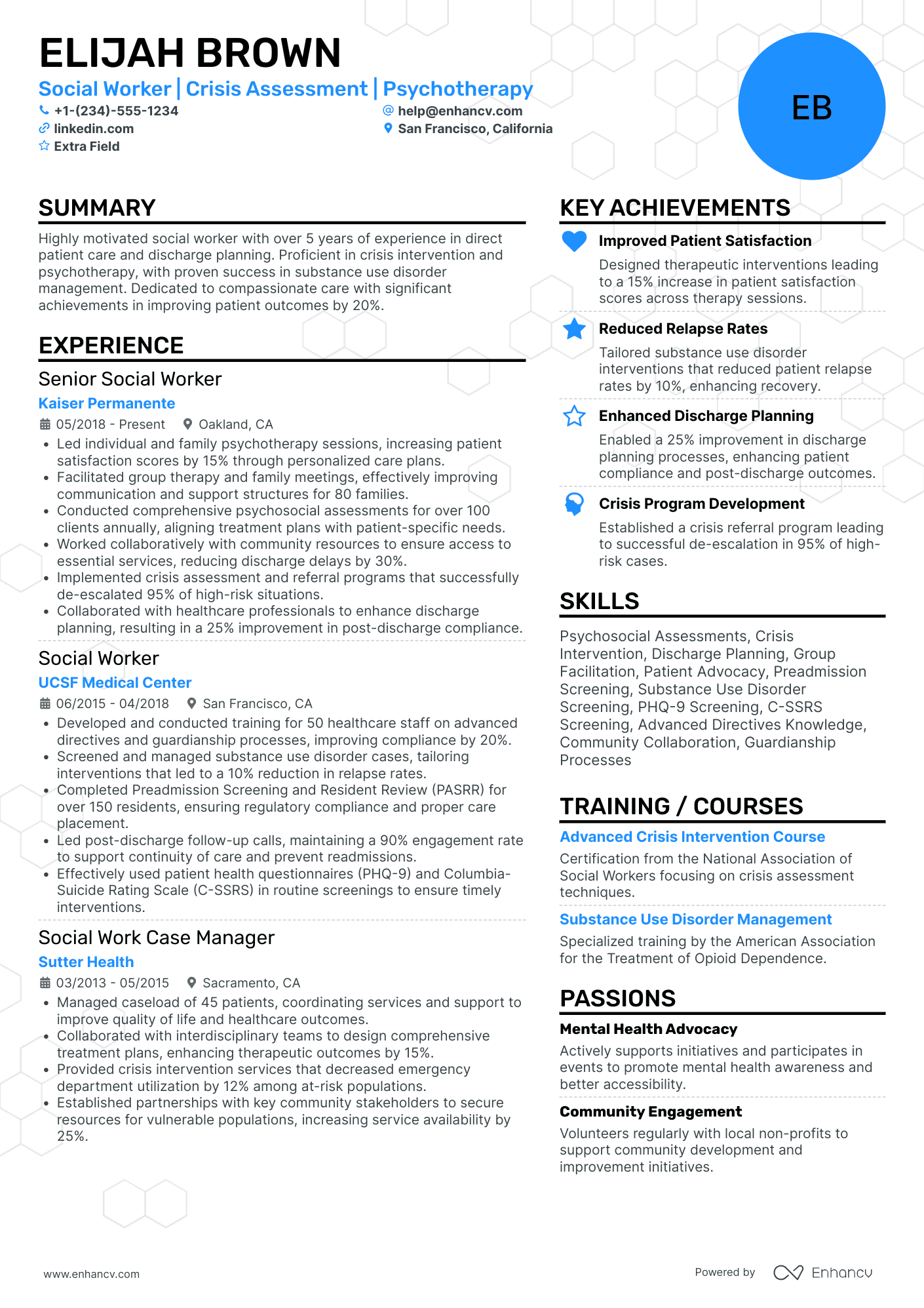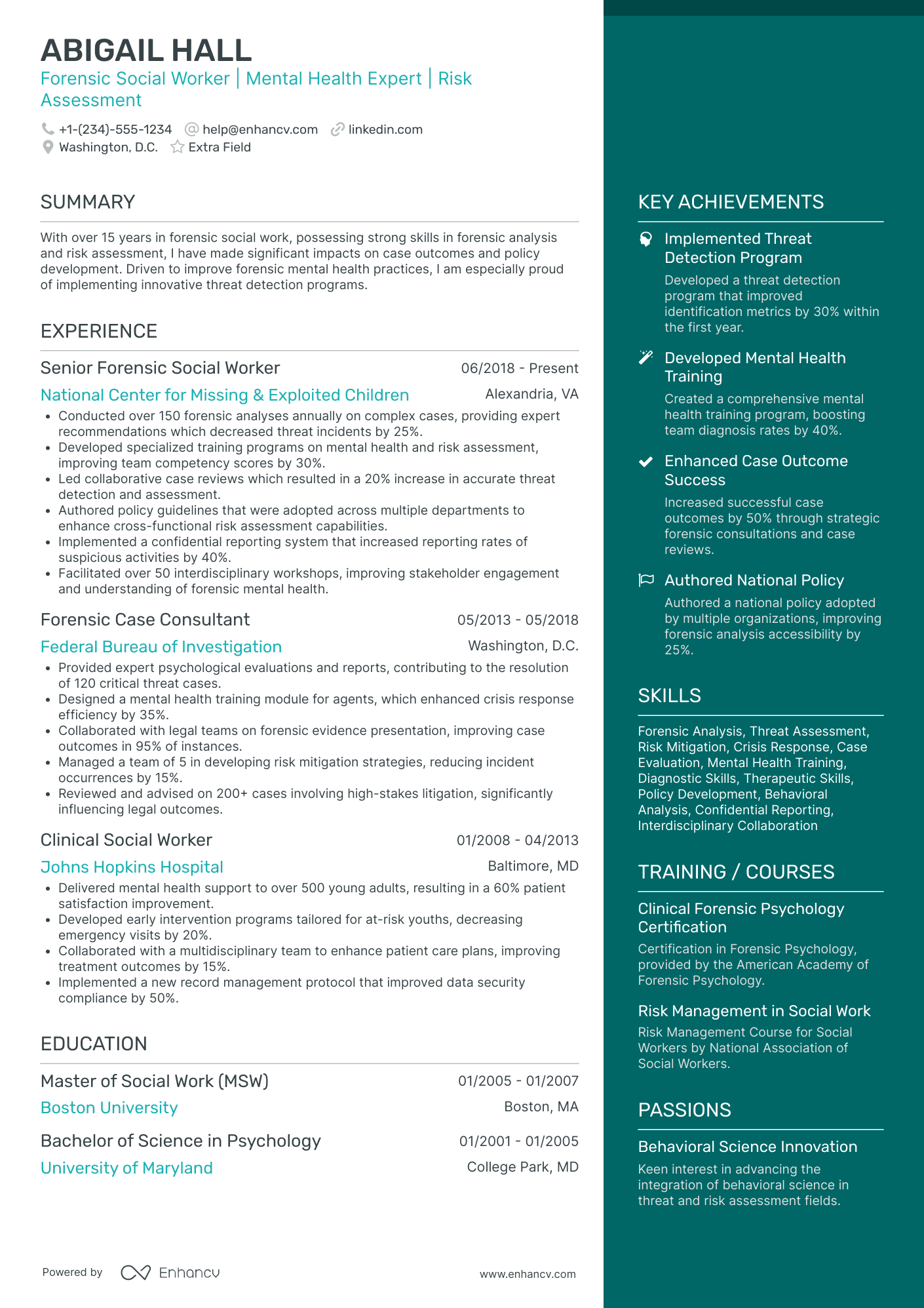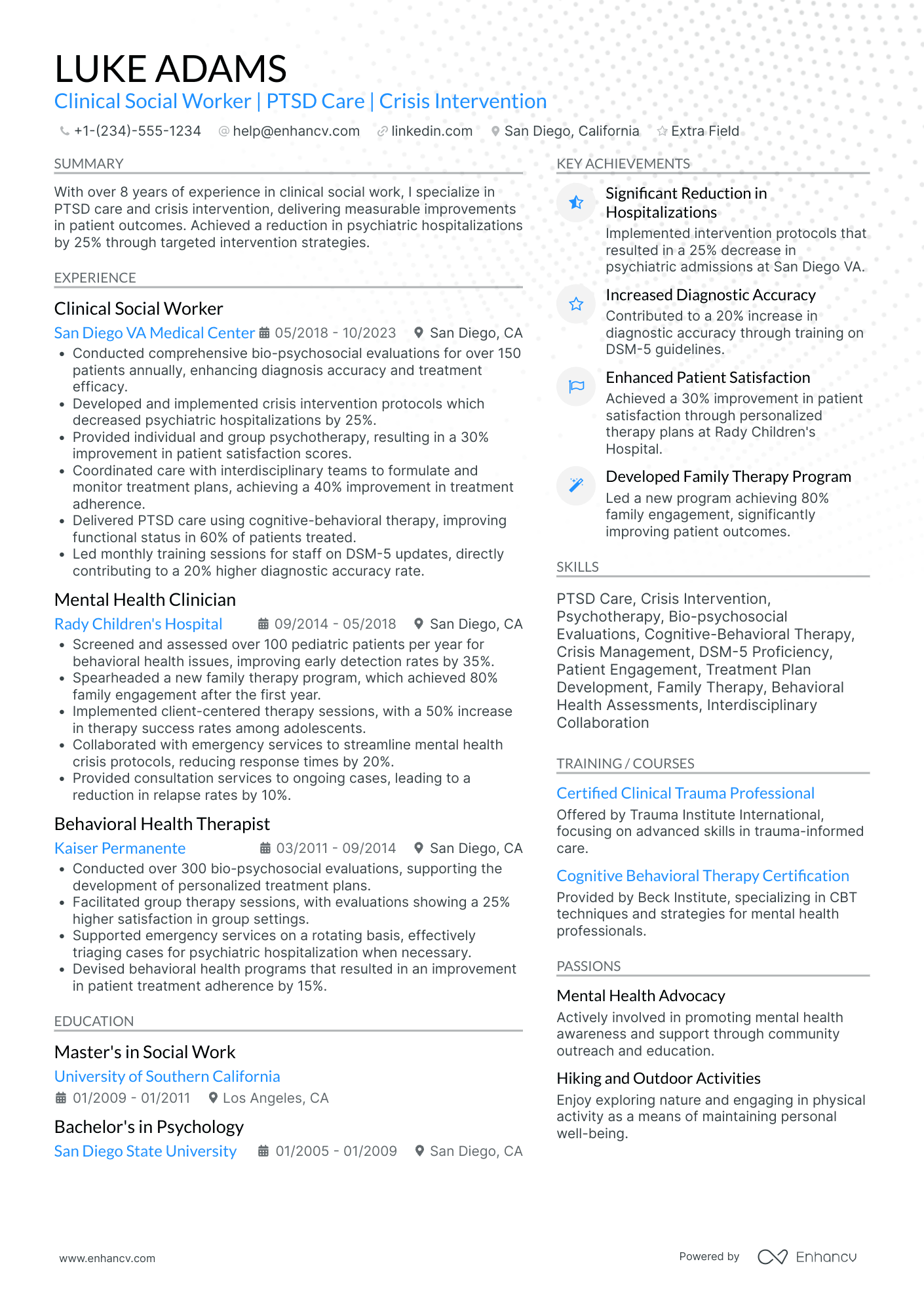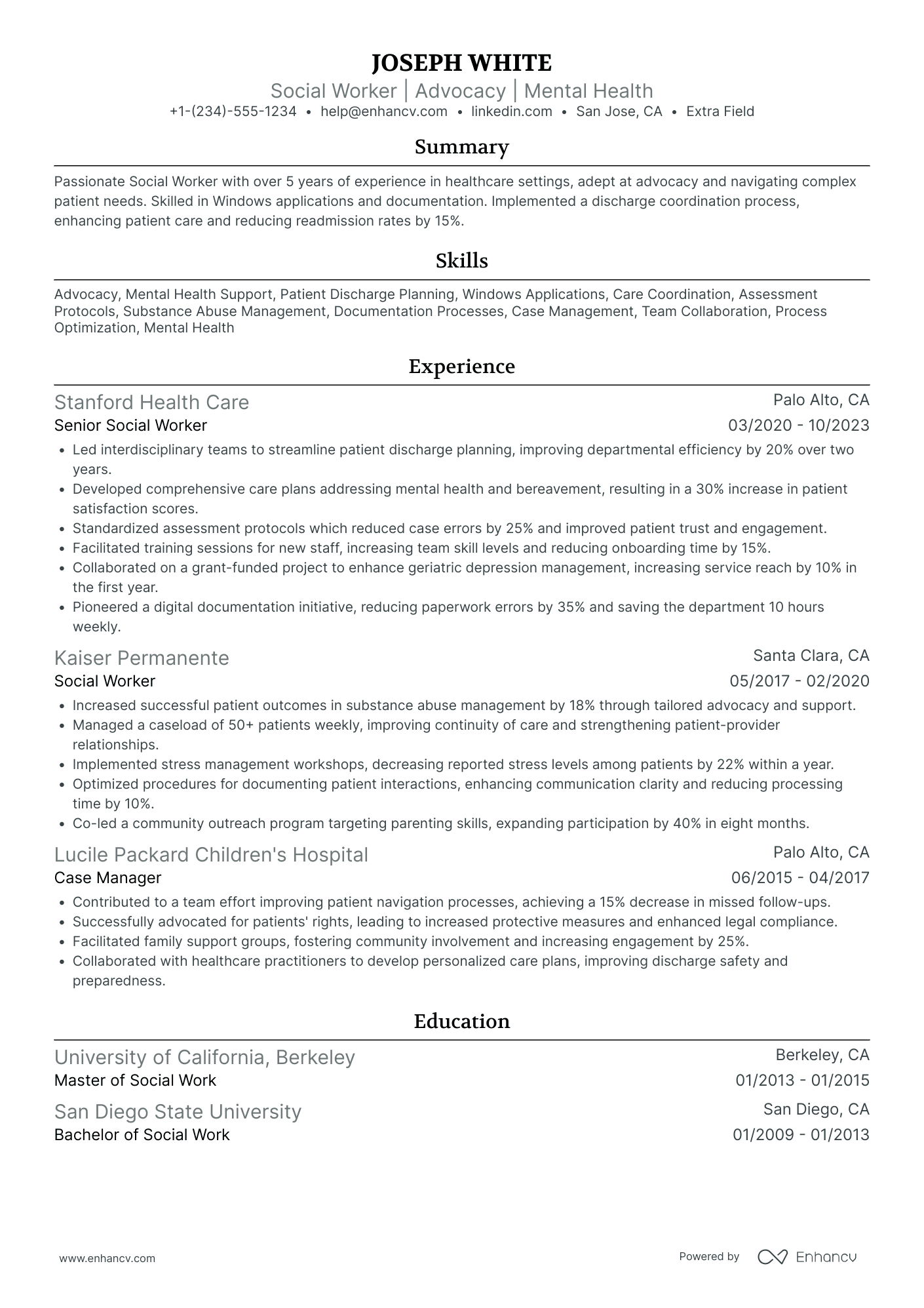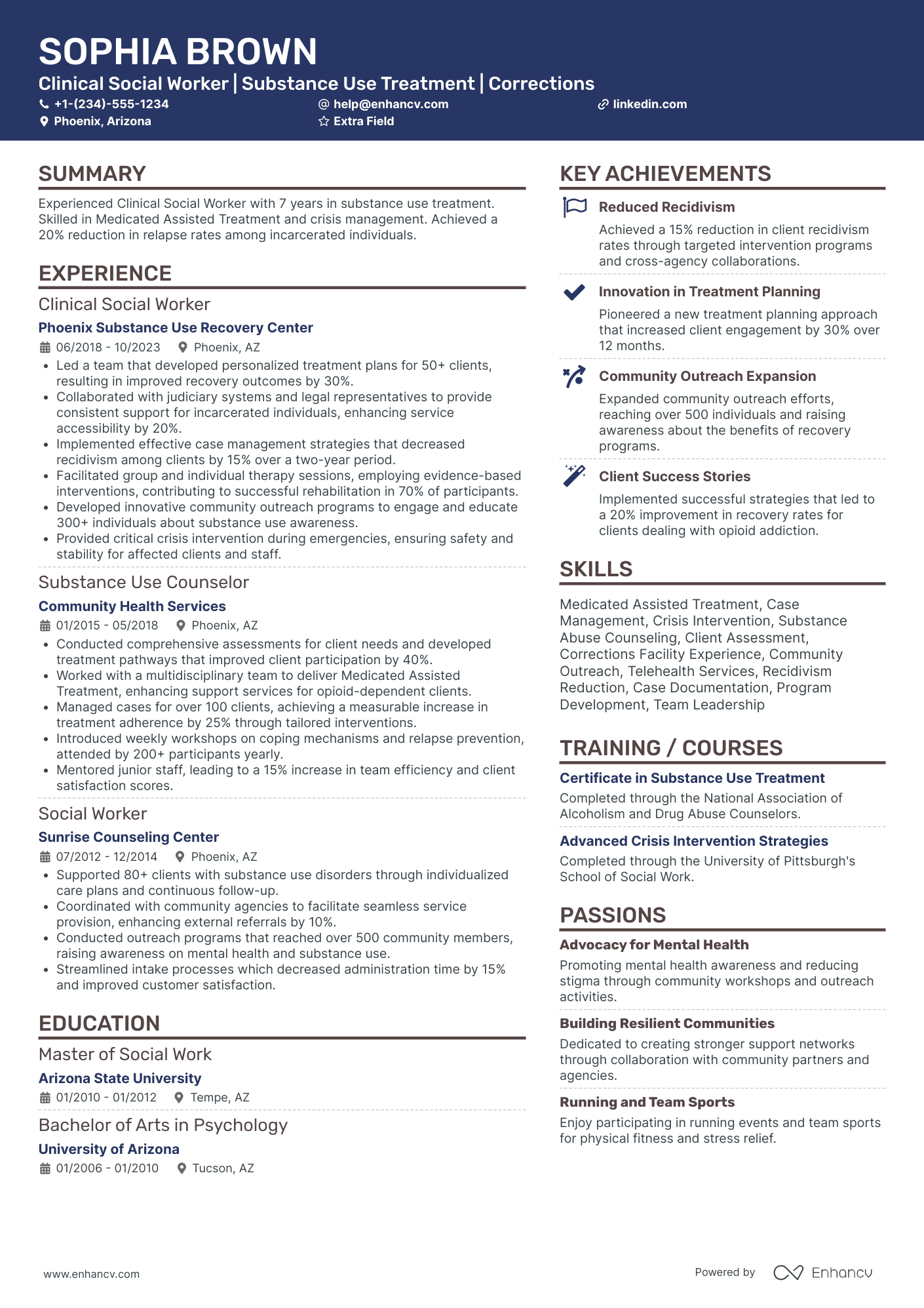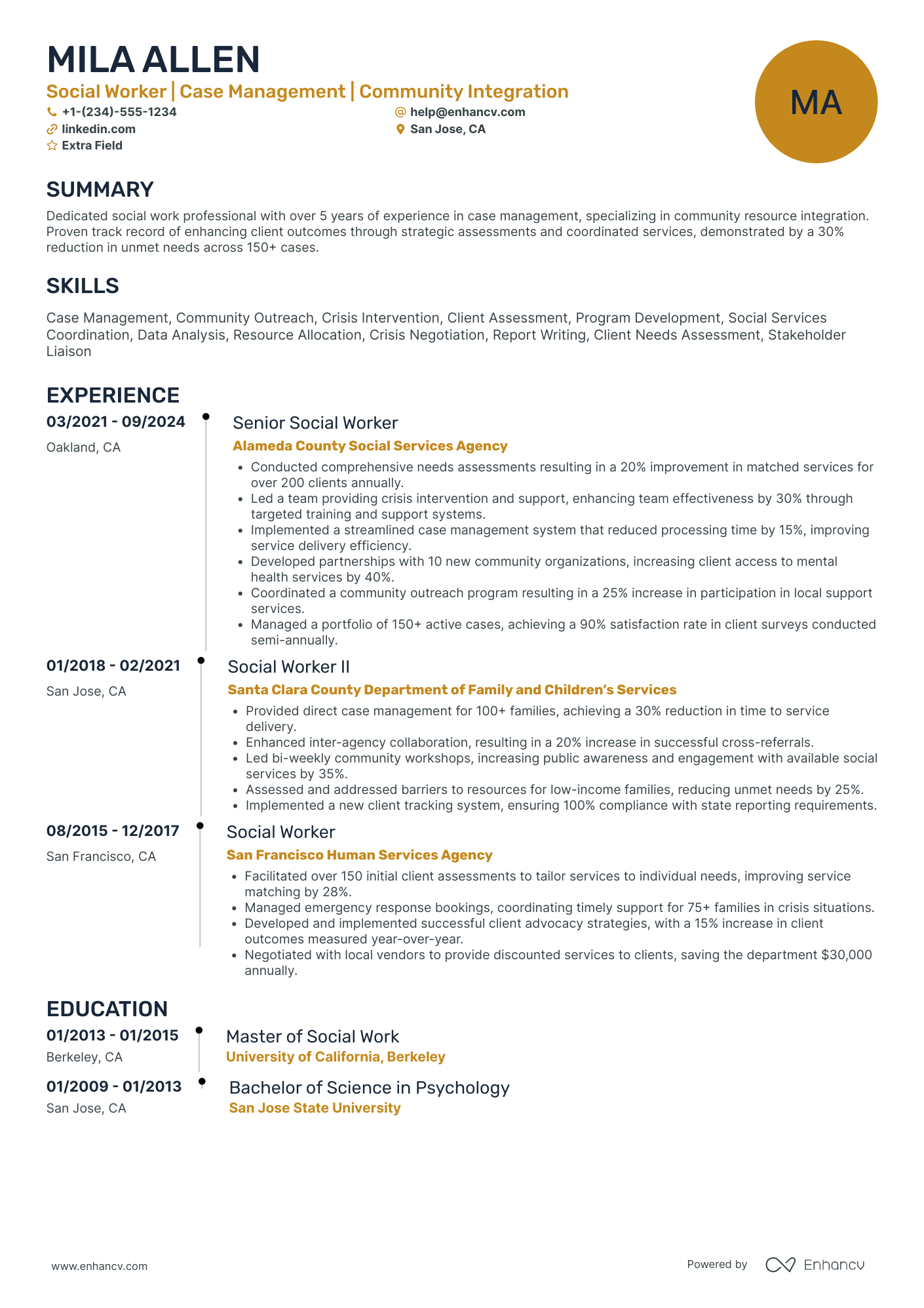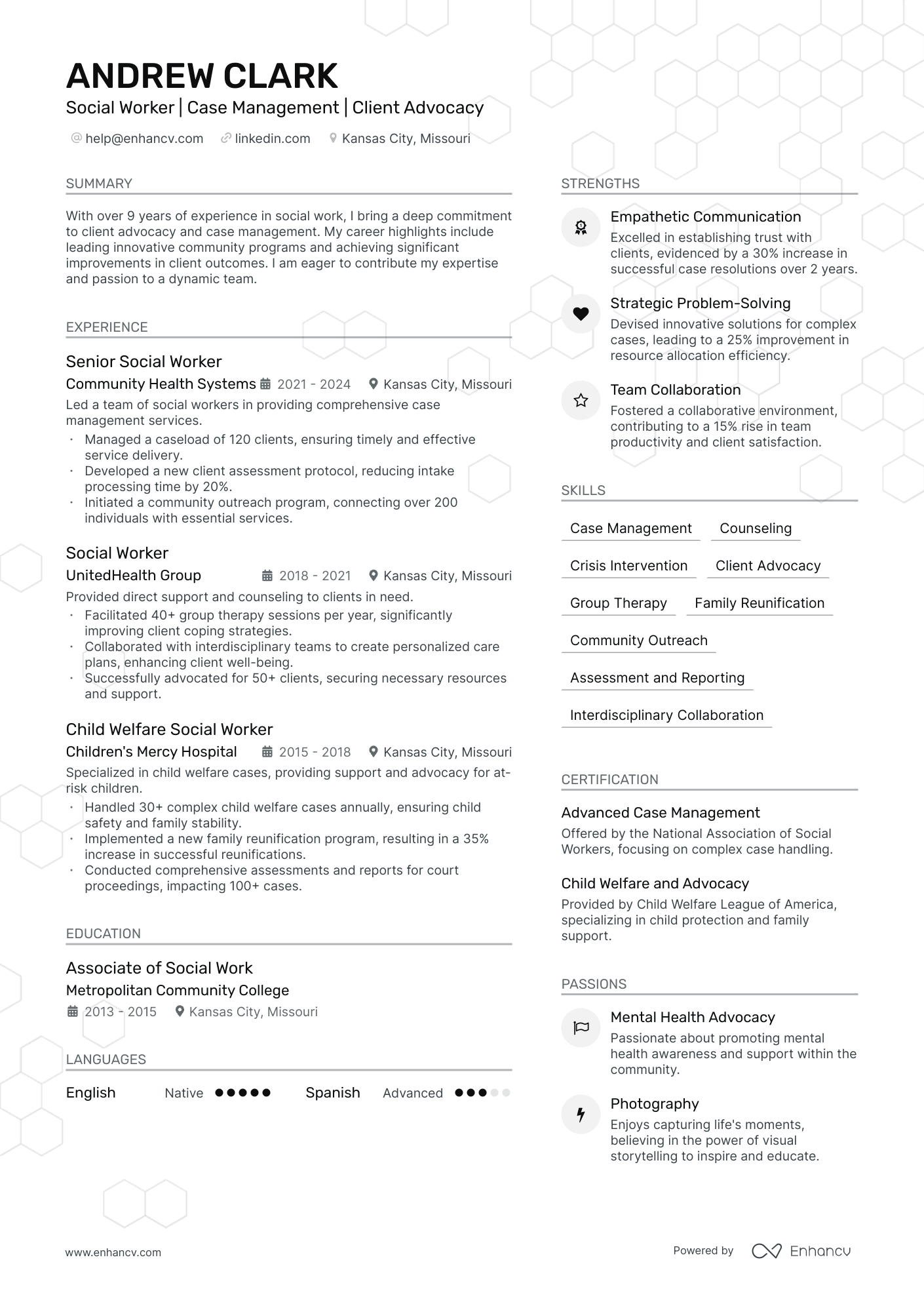Social work is a dynamic field that involves a combination of interpersonal skills and qualifications.
Social workers serve diverse populations, and each job or internship might require a different set of skills and experiences.
Therein lies the challenge of tailoring your social worker resume to each specific role, clearly demonstrating the direct experiences and skills that make you the right fit for the role.
In this guide, you’ll learn:
- How to highlight your career achievements in an experience section that hiring managers look for
- How to present your education and social work credentials so potential employers know that you have all the necessary qualifications
- How to showcase crucial soft skills that recruiters want to see like crisis intervention and communication
- How to give an overview of your career and highlight your commitment to social work with a strong summary
If you’re looking for something a little different, explore our guides for similar roles in social services:
- School social worker resume
- Social work intern resume
- Clinical social worker resume
- Social work student resume
- Social worker cover letter
Social worker resume example
Here’s what this applicant does well in their resume:
- Experience with diverse roles: Highlights experience in various social work positions, each with different responsibilities and achievements, demonstrating a broad skill set and adaptability.
- Quantifiable achievements: Uses specific metrics (e.g., "reducing intake processing time by 20%", "30+ child welfare cases annually") to quantify achievements, effectively showcasing impact and competence.
- Relevant certifications: Includes certifications in Advanced Case Management and Child Welfare and Advocacy, directly relevant to the field of social work, enhancing their credibility and specialized knowledge.
How to format a social worker resume
Having a career in social work requires specific credentials and requirements. You want to be sure that your information that is clear and understandable to anyone who looks at your resume.
The first thing hiring managers will notice about your social worker resume is the format. Send a clear message with an organized and professional format.
Here are a few areas to focus on to create a social work resume format that recruiters look for:
- Reverse chronological layout - As the name suggests, a reverse chronological layout focuses on work experience in reverse chronological order. Career paths to a social worker position can vary. Show a commitment to the industry and steady career growth with a reverse chronological resume.
- Professional header - Include a header at the top of your resume that clearly states your title and professional contact information. As roles and credentials in social services can vary, a header is your opportunity to introduce potential employers to your specific title right away.
- Single page - Potential employers will have tons of applications to sort through. Save them time by keeping every section of your resume short, concise, and relevant to your social work achievements.
- ATS optimized - Select fonts, keywords, and file formats that are optimized for Applicant Tracking Systems. Use ATS-friendly fonts like Rubik and Montserrat and a PDF file format in Enhancv’s resume builder to give your social work resume the best chance of making it to a human recruiter.
Different markets have specific resume formats – a Canadian resume could vary in layout.
Is your resume good enough?
Drop your resume here or choose a file. PDF & DOCX only. Max 2MB file size.
The top sections on a social worker resume:
- Personal summary: This section highlights the applicant's passion and commitment to social work, providing a glimpse into their motivation and dedication to help others.
- Key skills and qualities: Given the demands of a social worker role, this section should articulate essential skills such as empathy, resilience, and excellent communication skills.
- Work experience & achievements: Employers will be particularly interested in previous experiences in social work or related areas, as well as any notable achievements that demonstrate effectiveness in this role.
- Education and professional training: As social work requires specific academic and professional qualifications, this section is crucial to demonstrate that the applicant is suitably qualified for the role.
- References: References from previous employers or professional contacts can reinforce the applicant's aptitude for social work, offering third-party validation of their skills and experience.
What recruiters want to see on your resume:
- Education: Recruiters prioritize education because a degree in social work or a related field is typically required for professional social work roles.
- Experience in social services: Work experience in the field of social services is valued because it shows the applicant's practical knowledge and ability to handle the demands of social work.
- Crisis intervention skills: Given the nature of social work, applicants with crisis intervention skills are prioritized, as this demonstrates their ability to handle challenging and urgency-driven situations.
- Certifications: Certifications, such as a state license in social work or specialized training in specific areas (e.g., child welfare, substance abuse), show a candidate's dedication and specialized knowledge.
- Cultural awareness: Recruiters value applicants with a demonstrable understanding of multicultural issues as this is crucial in effectively helping the diverse range of clients that social workers encounter.
How to write your social worker resume experience
The experience section of your resume lists your work history along with 3 to 4 bullets highlighting your top accomplishments in the role. Show potential employers what you’ve achieved as a social worker so they will know what you will bring to their organization.
Be careful not to just list blanket roles and responsibilities. This is an opportunity to show how you’ve achieved success in the field and executed industry skills.
Let’s look at an example of a social worker's resume experience section.
- •Managed caseload and communicated with clients
- •Conducted intake and assessment of new clients
- •Developed community outreach program
What doesn’t work in this example:
- No numbers or data - Mentioning things like caseload and clients doesn’t go very far without quantifying them. Hiring managers want to see the scope of your work and the measurable results that you achieved.
- Duties and not accomplishments - “Conducted intake and assessment of new clients” explains what the candidate did in their role, but not if they were successful. Focus on results instead of tasks to show potential employers how you will impact success.
- Vague statements - “Developed community outreach program” doesn’t provide any relevant information about the candidate. Use the experience section to demonstrate achievements and industry skills.
Let’s make a few changes to this experience section and take another look.
- •Managed caseload of 110 clients and communicated through secure teletherapy platform
- •Implemented new client intake process, reduced intake processing time by 15%
- •Developed outreach program to provide free counseling services to the community, connected 250 people with essential services
What works in this example:
- Quantifies results - “Implemented new client intake process, reduced intake processing time by 15%” shows hiring managers measurable success by using real numbers and data to quantify impact. Back up your claims by providing measurable evidence of your success.
- Shows industry achievements - "Developed outreach program to provide free counseling services to the community, connected 250 people with essential services" demonstrates a commitment to the industry and an example of achieved success.
- Demonstrates relevant skills - Mentioning specific skills like “secure teletherapy platform” is an example of using keywords to tailor your resume to fit your target job.
How to quantify the impact on your resume
To show potential employers that you have successfully helped clients and managed cases, you must quantify the impact on your social worker resume.
Due to confidentiality agreements, social workers cannot always provide direct references or proof from past work experiences. This can make it hard to quantify successes or positive impacts, which are pivotal points in a resume.
If you’re not sure what achievements to include, here is a list of areas to consider when using real numbers and data on your social worker resume to emphasize your impact:
- Include the number of cases managed: This showcases the capacity to handle workload, manage time and multitask effectively.
- Show quantifiable client improvements: This can illustrate your success in helping clients achieve their goals and evidence a tangible impact.
- Detail size of multidisciplinary teams worked with: This can demonstrate your collaborative skills and ability to work within a larger organizational framework.
- Mention budgets you've managed: This portrays financial responsibility and an understanding of resource allocation.
- Specify your client demographic: Citing the average number of clients and demographic specifics can highlight expertise in a particular area of social work.
- Include success rate in linking clients to resources: This illustrates your efficiency and effectiveness in responding to client needs.
- Detail the number of crises handled: This underlines your ability to cope under pressure and your crisis management skills.
- Indicate the number of comprehensive assessments completed: This shows you can effectively understand and address complex client needs.
How do I write a social worker resume with no experience
The path to a social worker position varies from candidate to candidate. Maybe you are shifting from another area of social services or just finished school and are new to the field.
If you’re making a career change or new to the industry, you have to find a way to write a social worker resume with no social worker experience.
The key to an effective entry-level social worker resume is focusing on transferable skills instead of work history.
Follow these steps to writing an effective social worker resume with no experience:
- Choose a functional resume layout
- Focus on transferable skills
- Present education and credentials clearly
- Use additional sections to highlight skill development and specialty knowledge
- Tailor every section to fit your target job
A functional resume layout focuses on transferable skills rather than experience.
This is a great method to show potential employers other ways that you’ve learned relevant skills and tools like interviewing techniques and client database software.
Don’t pad your experience section with irrelevant jobs just to fill space. Only include roles that are relevant to your target position and focus on transferable skills.
Other jobs in social services like school counselor or case manager are great ways to show relevant skills. Even roles in customer service or community outreach present an opportunity to develop soft skills for social workers.
How to list your hard skills and soft skills on your resume
Social work requires specialized skills in tools and techniques. Present your skills so hiring managers know you are proficient in therapy techniques and client-tracking software.
Your skill section has two major categories. Hard skills are the technical knowledge and abilities needed to perform job duties, whereas soft skills are the interpersonal and communication skills needed to interact with others.
Listing hard skills on your social worker resume is fairly simple. Technical skills like software and assessment tools can be listed without a detailed breakdown.
Here is an example of hard skills on a social worker's resume.
If you’re including a hard skill on your resume, potential employers will assume you’re proficient. Only list hard skills that are relevant and that you’re confident in.
Here are a few more hard skills to consider for your social worker resume.
Best hard skills for your social worker resume
- Case Management
- Client Advocacy
- Problem Solving
- Intervention Planning
- Psychological Assessment
- Project Management
- Therapeutic Techniques
- Policy Development
- Knowledge of Social Work Theory
- Crisis Intervention
- Proficient in Microsoft Office
- Case Note Reporting
- Budget Planning
- Proficiency in Database Management
- Experience with EHR Software
- Experience with Social Services Software
- Public Speaking
- Multilingual skills
- Legal Knowledge
- Experience with digital communication platforms like Zoom or Skype
Soft skills tend to be open to interpretation so it’s best to explain. Including an example with each soft skill will help recruiters understand how you’ve achieved success by using those skills.
Here is an example of a soft skills section on a social worker's resume.
By providing examples of achievement with your soft skills, potential employers will see how you will impact success at their company.
Here is a list of top soft skills to consider for your social worker resume.
Best soft skills for your social worker resume
- Active Listening
- Empathy
- Communication
- Adaptability
- Patience
- Cultural Awareness
- Advocacy
- Resilience
- Problem-Solving
- Negotiation
- Time Management
- Emotional intelligence
- Organization
- Collaborative Teamwork
- Ethical Judgment
- Motivational Skills
- Sensitivity
- Tolerance
- Professionalism
- Respect for Diversity
How to list your certifications and education on your resume
Having the right credentials is crucial for social work. Your certifications and education should be prominently displayed on your resume so hiring managers see that you’re qualified right away.
Most social work jobs will require at least a bachelor’s in social work while others will require a master’s in social work.
While the specific requirements vary from state to state, practicing social work also requires a social work license. Typically licensure follows an exam after completion of a social work degree.
Let’s look at an example of an education section on a social worker's resume.
Your education section should include:
- Name of institution
- Name of degree
- Years attended
Additional information like GPA or coursework is not necessary. Only include it if explicitly requested, or if you are applying for an entry-level position and have relevant coursework.
Your certification section will also be short. Hiring managers will be looking to see if you meet the requirements. Save them time by presenting the information.
Your social worker certification section only needs to include the name of the certificate and the issuing institution.
Here is an example of a certification section on a social worker's resume.
Earning additional certifications is a great way to increase your employability as you continue your career. Certifications in specialized techniques and therapies will give your social worker resume a boost.
Here are a few certifications to consider for your social worker resume.
Best certifications for your social worker resume
- Certified Advanced Children, Youth & Family social worker (C-ACYFSW) - National Association of social workers
- Child Development Associate (CDA) - Council for Professional Recognition
- Certified School Social Work Specialist (C-SSWS) - National Association of social workers
- Certified Rehabilitation Counselor (CRC) - Commission on Rehabilitation Counselor Certification
- Certified social worker in Health Care (C-SWHC) - National Association of social workers
How to write your social worker resume summary or objective
A summary or objective is an opportunity to introduce yourself and your value in the industry to potential employers. It captures your career history and top accomplishments in 3-4 sentences.
Though the terms are often used interchangeably, there is a slight difference between a summary and an objective.
A summary is a brief introduction that summarizes your career and top achievements. An objective looks to the future and captures what you are hoping to achieve in your new position.
A summary is more suitable for candidates with experience in the field. Entry-level candidates are more likely to focus on an objective.
If you have at least some social work experience, combine them by writing an introduction, a career highlight, and a goal you share with your target employer.
Let’s take a look at an example of a social worker resume summary.
What doesn’t work in this example:
- Generic buzzwords - Words like “experienced” and “passion” don’t mean much if they aren’t quantified. Hiring managers want to know exactly how much experience you have and what your passion has helped you achieve.
- No measurable results - “I have handled complicated cases and reunited many families” is left open to interpretation. How were the cases complicated and how many families were reunited?
- No objective - Just stating that you want the job isn’t a sufficient objective. Research your target company and find out what solutions you can provide to their challenges.
Let’s make a few changes and look at this summary again.
What works in this example:
- Introduces credentials - Since credentials are valuable in social work, it’s a great idea to let hiring managers know right away that you have relevant certifications and specific experience.
- Highlights accomplishment - “I implemented a new family reunification program which resulted in a 20% increase in reunifications” shows a specific achievement in the industry and gives potential employers a good idea of your abilities.
- Shared goal - “Seeking the opportunity to leverage assessment experience and increase family reunifications at Children’s Community Center” lets hiring managers know how this candidate’s specific experience will impact success in their new role.
Optimize your resume summary and objective for ATS
Drop your resume here or choose a file.
PDF & DOCX only. Max 2MB file size.
Additional sections for a social worker resume
There are different kinds of social workers so it follows that there are many different paths to get there. Additional sections on your resume can be a great way to show how you’ve developed social work skills in unique ways.
Here are a few sections to consider adding to your social worker resume:
- Languages - Speaking multiple languages can be a great skill for social workers, especially if your clients have a first language other than English.
- Continuing education - Continuing to expand your education and complete training for things like cognitive behavioral therapy or dialectical behavior therapy is a great way to keep your resume up-to-date and increase your employability.
- Volunteer work - Volunteering is a great way to develop social work skills and show achievements outside of work history.
Key takeaways for writing a great social worker resume
Congratulations! You’re almost ready to send out that amazing social worker resume that gets callbacks! Let’s take a moment to briefly review some key points.
- Create a clear and professional social worker resume with a format that communicates key information to hiring managers and gets through ATS filters.
- Quantify the impact on your resume by using real numbers and data to show how you’ve achieved things like managing cases and reuniting families.
- Strike the right balance between soft skills and hard skills so potential employers know you can handle the technical aspects of the job as well as interpersonal communication.
- List your education and certifications clearly so that hiring managers will see right away that you meet the requirements to fill the role.
Social Worker resume examples
By Experience
By Role
